#robert only appeared in part one of the episode
Text
I just sat up all night praying that he won’t die.
Danny offers himself as help to Andy on the farm. It’s a new day and DI Keysell is once again keeping an eagle’s eye on Andy and Robert. Alan and Rodney check on Jack via Robert who is clearly exhausted at this point but Rodney manages to lighten the mood at least temporarily. Jack’s doctor easily persuades Keysell to leave the room post haste. Jack begins to stir.
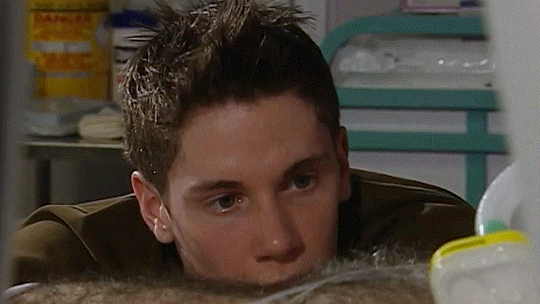
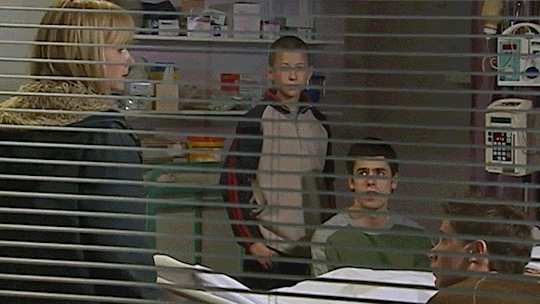
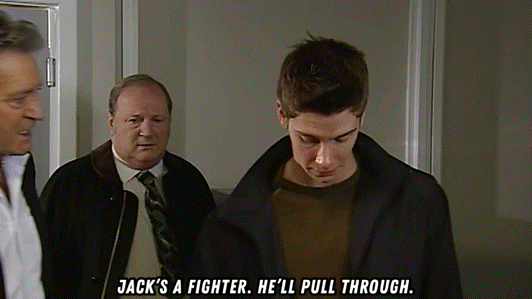

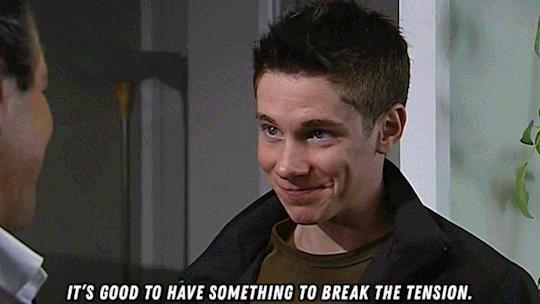
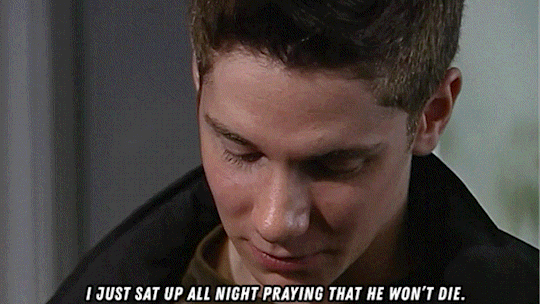
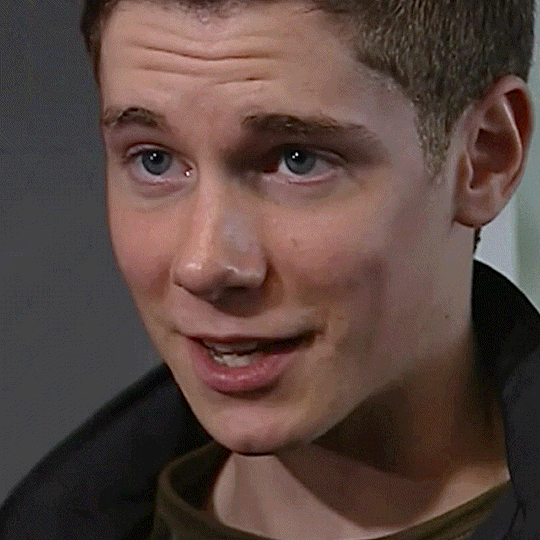

20-May-2004
#classic ED#classic ED Robert’s story#20040520#episode 3745#classic ED 2004#200405#poor robert looks exhausted#robert only appeared in part one of the episode#jack sugden#robert sugden#karl davies#andy sugden#Daz Eden#danny daggert#DI keysell#alan turner#Rodney blackstock#dr Morten#katie sugden
8 notes
·
View notes
Text
Here's what you missed on Hatchetfield...
Okay so Nerdy Prudes Must Die is happening in a month's time and I'm aware that lots of people who enjoyed guy who didn't like musicals and black friday might not have had time to watch nightmare time. While Nick has said this musical will be fully stand alone and no knowledge of nightmare time is required, nonetheless some of you might be curious about what we've learned that might come up
Presenting a tldr lore drop for nightmare time:
1) Wiggly has brothers (aka the Lords in Black)
You remember Wiggly from black friday? That ugly green little fucker? Well turns out he has brothers. They call themselves the Lords in black because they're pretentious little fucks and they all have different 'powers'.
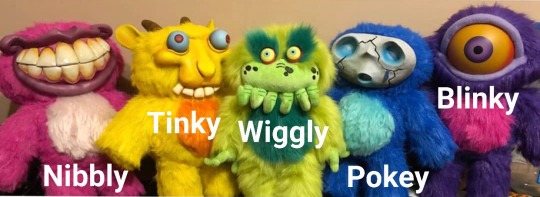
Itemised list
Pokey (pokotho) - mind control type stuff, likes to make hiveminds
Wiggly (Wiggog Y'wrath) - idk you saw black friday whatever the fuck goes on there
Blinky (blinklotep) - massive eye, likes watching things
Tinky (T'noy karaxis) - fucks with time
Nibbly (nibblenephem) - massive mouth, eats shit
You've actually met Pokey before - remember the blue shit from guy who didn't like musicals? That's the same blue shit leaking out of the cracks in pokey's face in the picture above.
They also have a sister called Webby that I believe Hannah references in Black Friday. We don't know much about her but thus far she seems like a good guy
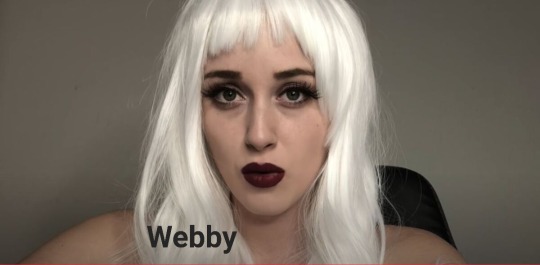
2) Grace Chasity is a nerdy prude
Remember the girl Bill is trying to set Alice up in guy who didn't like musicals because 'at least she's nice to him in church'?
Well turns out Alice was right. Grace Chasity is a nerdy prude. And also coincidentally one of the main characters of Nerdy Prudes Must Die (to be played by Angela Giarratana).

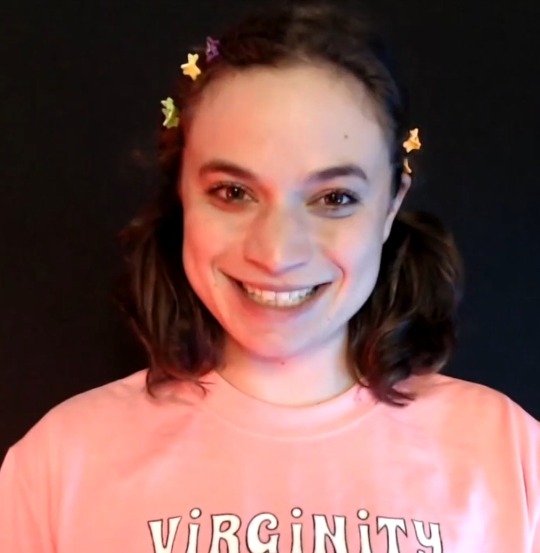
We meet her in nightmare time 2 (episode 2 part 2) which takes place at a religious camp designed to educate people about the perils of pre marital sex.
Grace Chasity is, well she's many things, but she is very much the stereotype of an American evangelical Christian. She even showers with a swimming costume on so as not to tempt herself into sin.
Despite all this, however, she is a devious motherfucker who will absolutely fuck you up
3) You remember Ted from guy who didn't like musicals...
Well not only are he and the homeless guy the same person (time travel, its a whole thing, blame the yellow guy from the Lords in black photo)
But also we learn that his surname is Spankoffski (because of course it is) and he has a 'nerdy little brother' called Pete Spankoffski who will be one of the leads in nerdy prudes. In nightmare time he's played by Nick Lang but in nerdy prudes he'll be played by Joey Richter
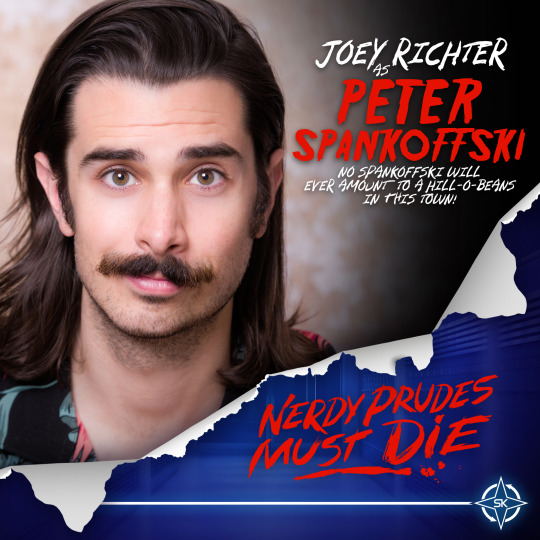

We meet Pete in nightmare time 2 (episode 2 part 2) but we've actually met him before in guy who didn't like musicals. You remember hot chocolate boy? The one who had very low blood sugar?
Yup you guessed it that is one Peter Spankoffski
(If you've been super out of the loop and are wondering why he was recast and for that matter where the heck is Robert anyway just trust that that is a whole thing im not going to get into and it's for the best he's gone)
4) Meet the Lauters
Two more characters who have been announced for NPMD who we met in nightmare time 2 are Stephanie Lauter (Mariah Rose Faith) and her father Solomon Lauter (Corey Dorris)
Steph is actually pretty nice and chill on the inside but definitely has a reputation for being a bit of a party animal/wild child.
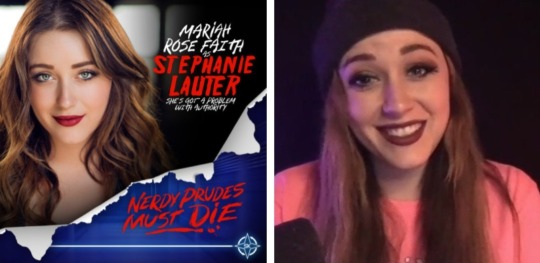
This isn't helped by her father who is the mayor of hatchetfield and from what little we see of him will always put his career before his daughter.

Steph and Pete hook up in nightmare time so look out for a possible romance between these two
5) What the fuck is a Holloduke?
You may have seen the word 'holloduke' batted a lot around this fandom lately which refers to the ship of two characters that we've been introduced to through nightmare time.
While it's unclear if either of them will appear in nerdy prudes, given that both Kim and Curt are in the cast and they go a long way out of their way in nightmare time to show Kim's character getting a job at Hatchetfield High in set up for *something* a lot of people think there's a good chance she at least will be appearing.
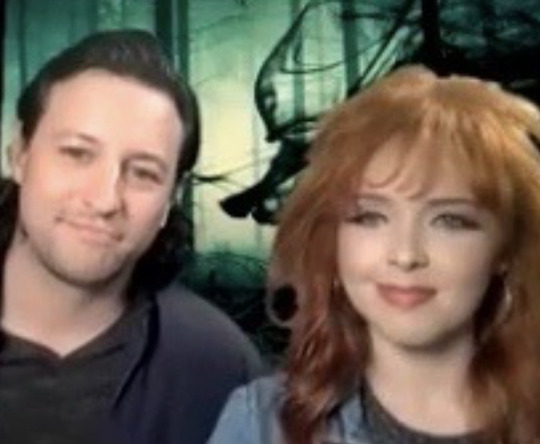
The Hollo of these characters is called Miss Holloway although at the end of nightmare time she ends up ret conning herself and is forced to assume a new identity as Miss Holiday so if we meet her in nerdy prudes that will likely be her name. She is a witch who has a deep love for all things 80s. We don't know a huge amount about her but that might be because she's cursed(?) so that anything she reveals about her backstory will be instantly wiped from the mind of the listener.
Curts character is an ordinary social worker called Duke who among other things works with Hannah and Lex when they're having troubles with their mum. He's in love with Miss Holloway/Holiday, and it's reciprocated, but due to the curse(?) et al things keep not quite working out for them.
They're both absolutely wonderful people who deserve the world and are absolute OTP fodder
6) The Gift
We don't know a huge amount about this yet but we do know that some people in Hatchetfield, notably including Hannah from black friday have something called 'the gift' which gives them some loose powers
Most people grow out of the gift as they go through puberty, for instance Lex also used to have it, but they may be able to use it in some scenarios (such as manifesting a firearm from the black and white as Lex does in Black Friday)
People with the gift were historically persecuted in Hatchetfield by a group of people called 'the hatchet men' who may or may not have turned them into trees(?)
7) The Black Book
There is a book of spells called the black book which Miss Holloway/Holiday uses to do her magic

#starkid#hatchetfield#guy who didnt like musicals#tgwdlm#nerdy prudes must die#npmd#black friday#nightmare time
904 notes
·
View notes
Text
The funniest part of the whole conflict about paternity that was raised in this episode is that it is literally pointless for two distinct reasons:
1. Rhaenyra’s children are not bastards.
2. Regardless of the paternity, Rhaenyra’s children are still Targaryens.
So lets break this down.
Number 1: The bastard question

Alicent is pissed that Rhaenyra is “committing treason” or whatever by having kids with someone else but… her kids aren’t bastards. And I don’t mean that in a “hey Alicent your kids suck but Nyra’s are chill” kind of way, I mean that literally. If we (the viewers) were going to label them, then we would say they were some combination of either being conceived through surrogacy (for Laenor? but meh not really) or that they were more or less adopted.

Typically, “bastard” refers to the child born from the union of a married man (lets call him A) and a woman that he is not married to (we’ll call her C). Because the child is born to C, someone not part of the marriage between A and B, the child is not recognized as part of their lineage, and is not claimed by both A and B. For one, it is a lot harder to pass off a child as your own if you just suddenly seem to have the baby overnight, without either member of the couple ever visibly appearing pregnant. And for another reason, most women probably wouldn’t want to claim a child that their husband had while engaging in an affair. (Of course, this does not include questions of surrogacy or non cis hetero couples, but that would be a much longer discussion).
Number 2: Fire and Blood
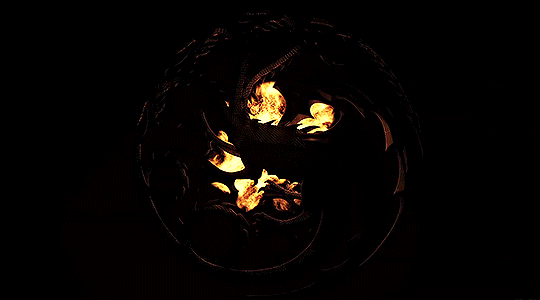
Alicent, and everyone else in the episode, keeps saying that it is a “grave accusation” or whatever that Rhaenyra’s kids aren’t biologically related to Laenor but it truly just? Doesn’t matter?? Laenor’s family isn’t the ruling family. Rhaenyra’s is. So, like she tells her son, the only thing that matters is that they are Targaryens.
If Alicent were to cheat, if her children’s paternity were questioned, that would be treasonous. Because she married into the Targaryen house. She has no claim to the throne on her own- her only connection to it is through her husband. So if her kids didn’t biologically belong to Viserys, then they wouldn’t have a claim because they wouldn’t be Targaryens, and they could not sit on the throne. (This is why its considered such a big deal that Cersei’s children are not Robert’s biologically in season 1 of Game of Thrones.)
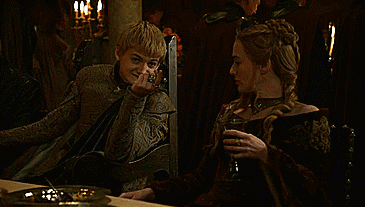
But that just doesn’t matter for Nyra because she does have a claim to the throne in her own right and as a Targaryen, and any children she gives birth to are going to have Targaryen blood.
It is fascinating to me that this is such a sticking point, not just for Alicent but for everyone in court, because it shows that so many of them still haven’t fully accepted that Rhaenyra really is the heir. The Targaryen dynasty flows through her bloodline, not her husband’s, so it doesn’t matter who the father is as long as she is the mother. And the council and court haven’t really accepted that, or maybe they have and they just don’t realize that because Nyra is the heir, their understanding of how things work has to change.

So Alicent is acting as though she is someone fighting for honor and duty and the maintenance of bloodlines, when her reasoning is completely unsound and based on false equivalency. So instead she just comes across as this holier-than-thou purity-culture warrior trying to restrain Rhaenyra under the same rules that she herself is trapped by.
Conclusion:
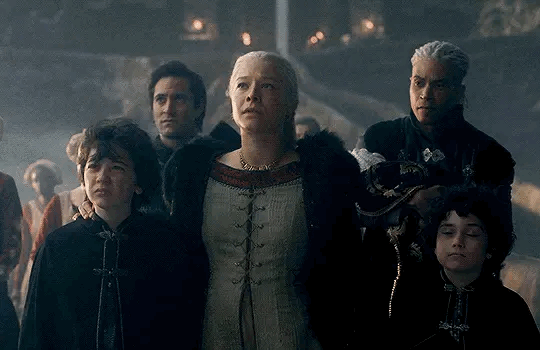
The paternity of Jacaerys, Lucerys, and Joffrey Velaryon does not matter.
Because a) they have been claimed by both Rhaenyra (and House Targaryen) and Laenor (and House Velaryon), and because b), regardless of who their biological father is, they were born to Rhaenyra, their blood is still Targaryen.
#house of the dragon#house targaryen#hotd ep 6#hotd spoilers#hotd thoughts#hotd#got#asoiaf#anti alicent hightower#alicent hightower#rhaenyra targaryen#laenor velaryon#rhaenyra x harwin#daemyra#viserys targaryen#jacaerys velaryon#lucerys velaryon#joffrey velaryon
792 notes
·
View notes
Text
My thoughts on The Last of Us HBO:
The opening credits are fucking amazing and good thing they kept most of Santaolalla's work or hands would have been thrown.
Pedro fucking slaps as Joel Miller - Construction worker
I have seen Sarah die in game like ten times in my reruns at this point but god did I want to cry when I saw the scene in the series
I like that they showed us the first third of the episode from Sarah's POV, whoever has played the game or seen gameplays knows what's coming, but you need that extra info for the people who don't know anything, and what better way to make you feel attached to the character than to show everything through their eyes?
Some scenes are shot in the exact angle you get in the game, like the truck scene and Sarah's death. I look forward to seeing more of those details
Quarantine zone looking a lot like I'd imagine a real life one would look. Abandoned run-down buildings? Neat.
Tresspassers are now hung in public in the show, not executed in line on the streets like in the game, but it does drive the point across. We don't see how they execute infected people so far in the show.
I only wish we'd get to see more of the transport/sneaking/puzzle solving involved in the game. I know it's not practical, but I feel like Joel and Tess's chat with Marlene could have happened on the move like it did on the game.
Tess my beloved, I feel like at this rhythm next episode will be your last, but I love you
Marlene is the Marlene from the game, Merle Dandridge. Amazing detail.
Wish Tess and Joel would have killed Robert like in the game, they had beef with him and it showed.
Bella as Ellie fucking slaps, they are killing it so far and I'm really looking forward to seeing her Ellie grow as a character. Also, their Ellie snarkiness and sarcasm? On point.
Give me more moving terrain scenes please, sneaking through the guards when trying to escape the quarantine zone was one of my favourite parts in the game.
They kept the exact same music and sound effects from the games where it counted, like in the Sarah scene, the part where Joel and Ellie get back to Joel's place and wait until night to leave, etc. They kept some dialogue the same as well.
Neat thing, with the radio codes. I love the music as well, it'll be cool to see how that progresses later on! Looking forward to crying if I hear True Faith or Take on Me.
The effects look amazing, Clickers will probably make an appearance as enemies in the next episode and they are looking very good. Very much looking forward to the runners and the Bloater as well!!!
We'll now get more backstory for Bill, so I'm expecting that will be... Fun and sad at the same time. I liked him in the game, and now that we're getting more context... Well, I'll feel more for him.
Apparently this season will be 9 episodes long, so they'll either cover the whole first game in this one (which seems likely considering the pace so far) or maybe they'll split summer and autumn and then winter and spring in season 2? Who knows
The teaser for the whole season shows scenes from the winter chapter and also a shot that seems to be from the end of the game, when Joel is trying to rescue Ellie from the Fireflies' hospital, so perhaps they will adapt the whole game in a season.
#the last of us#joel miller#ellie williams#pedro pascal#bella ramsey#tlou#tlou hbo#the last of us hbo#the last of us hbo spoilers
428 notes
·
View notes
Text
William Hootkins in the 1970s.
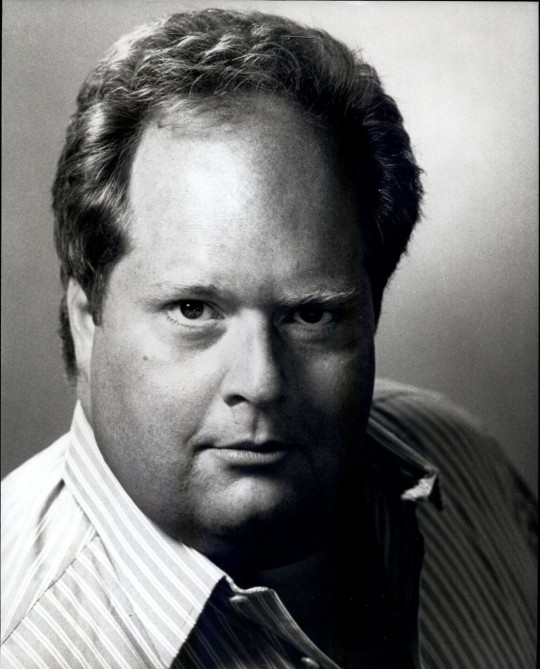
William Hootkins was born in Texas in 1948. He was active in theater in High School and at Princeton University and interested in becoming a professional actor after graduating. His his friend John Lithgow recommended he move to England to continue his acting education, probably because he knew he'd get greater opportunities. So he moved to England in the 1970s and trained at The London Academy of Music and Dramatic Art. He continued mainly in theater and took film roles when he could. His first film role was a small role as a henchman in the British R rated film, Big Zapper in 1973.
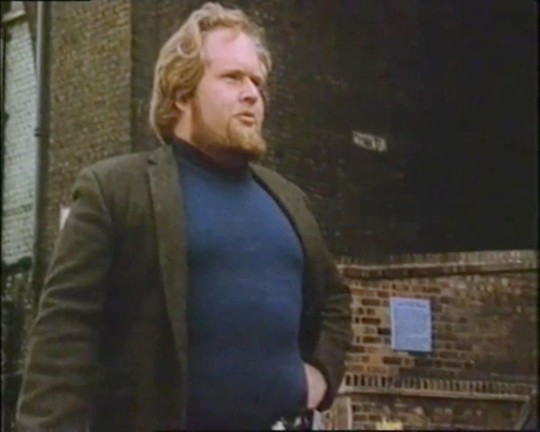

Big Zapper, 1973. Small role and Hootkins would've been 24-25 years old during filming.
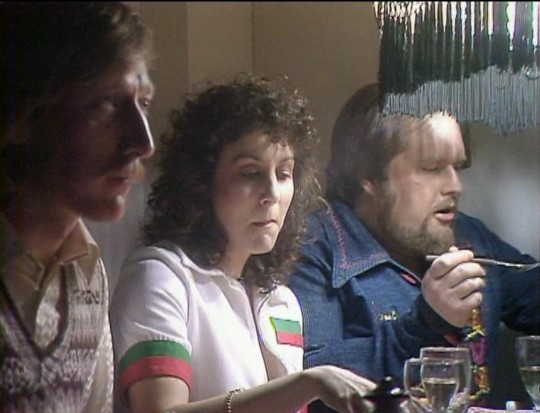
Anthology series Plays for Britain. Hootkins gets a small role in the episode The Paradise Run in 1976.


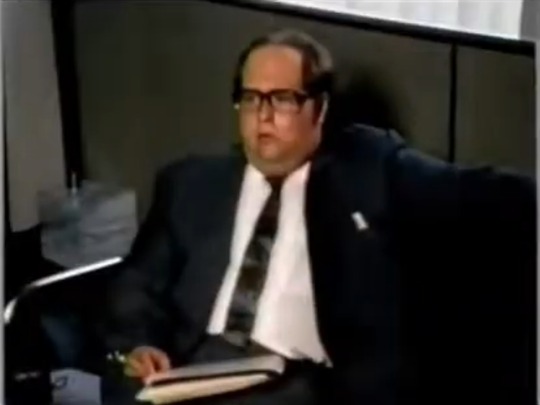

An anthology Documentary series, Horizon, which featured film adaptations of real-life events. Hootkins had a greater role in this 1976 offering Billion Dollar Bubble which starred James Woods about Insurance Company fraud in the early years of computers.


Still in his 20s, Hootkins got a small role in a major American film directed by Robert Aldrich and the opportunity to share a scene with Charles Durning, Twilight's Last Gleaming in 1977.
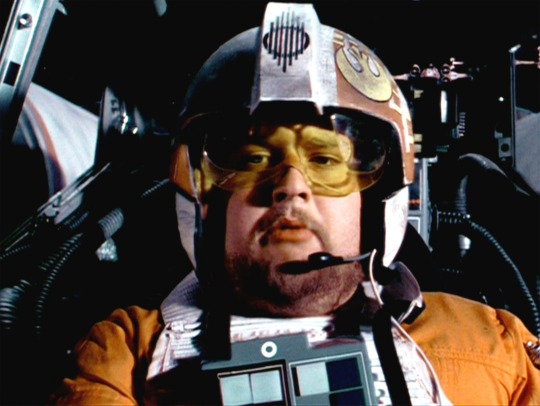
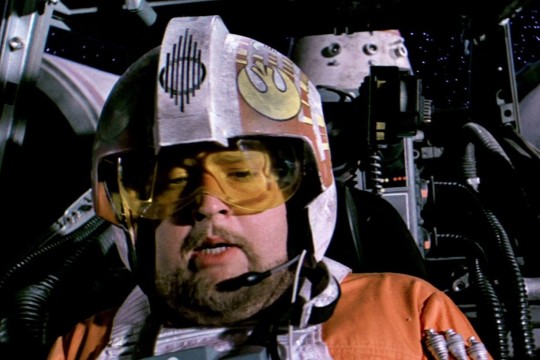

Also in 1977, Hootkins played Porkins in a small role in the 1977 blockbuster Star Wars. Small role but big enough to get his own action figure.
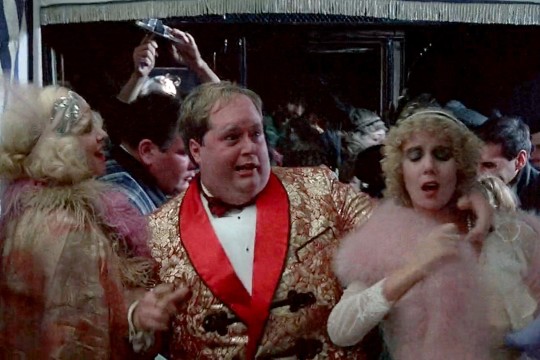
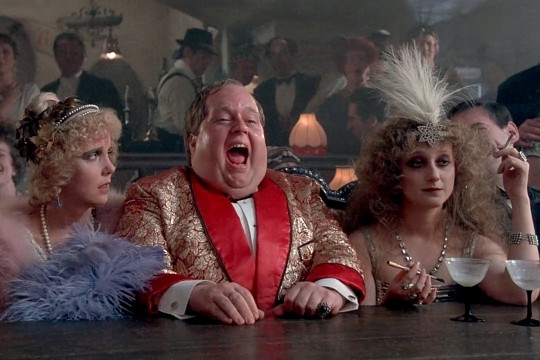
And again in 1977, Hootkins worked with Director Ken Russell in Valentino in a high energy scene of a drunken, egotistical silent film star. The movie was a bomb mainly because it wasn't the biopic of Rudolph Valentino that people expected. Russell took too much license in the life of Valentino to tell a more interesting story. I think what was known of the real lives of stars back then was greatly what the studio wanted to present to the public. So I think Russell was justified.
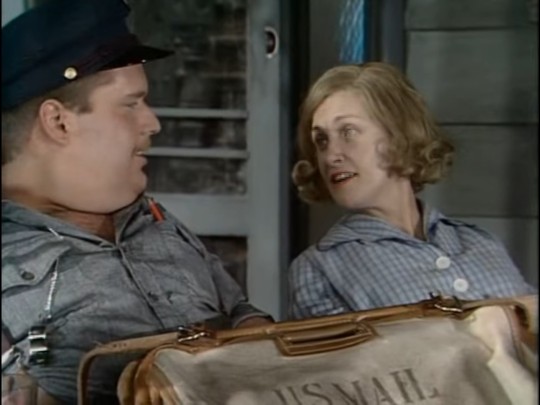

1977 was an especially good year for William Hootkins. The above photos are from a US-UK collaboration of a teleplay version of Come Back, Little Sheba starring Laurence Olivier and Joanne Woodward. Hootkins is in one scene only. Also in 1977, Hootkins appeared in episodes of British TV series, Van der Volk, Yanks Go Home, Plum's Plots and Plans and Documentary Series, The Lively Arts.
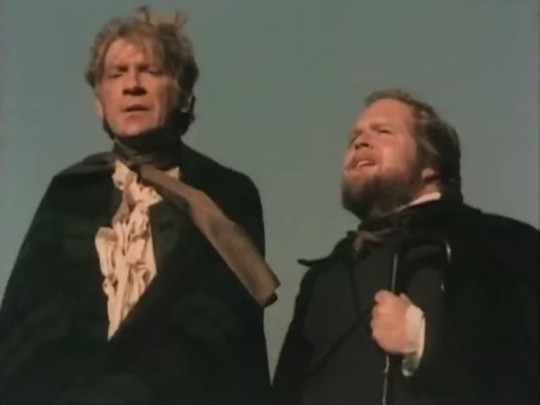

In 1978. Hootkins appeared in Part 1 of Clouds of Glory, a 2-part series of the lives of Poets, William Wordsworth and Samuel T Coleridge. Hootkins appeared with David Warner.
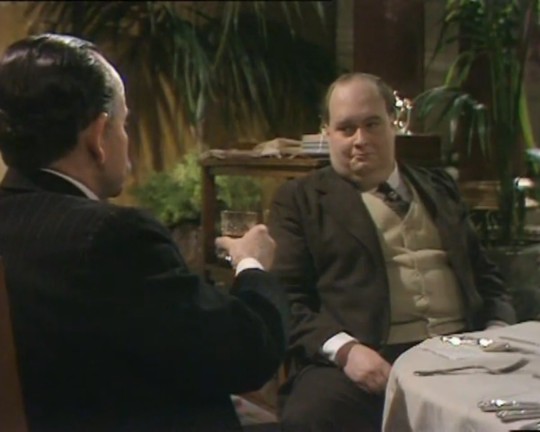

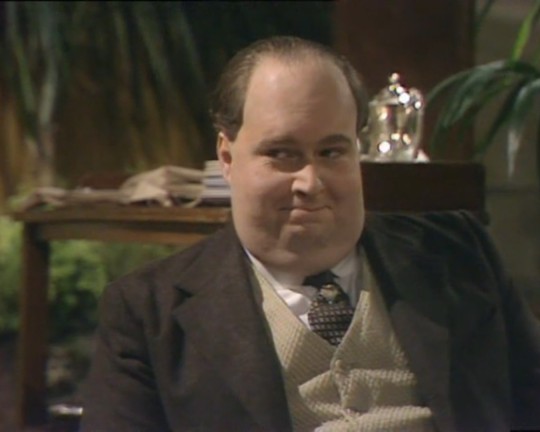
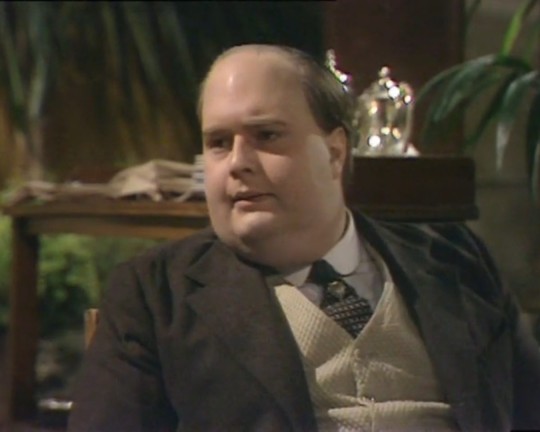
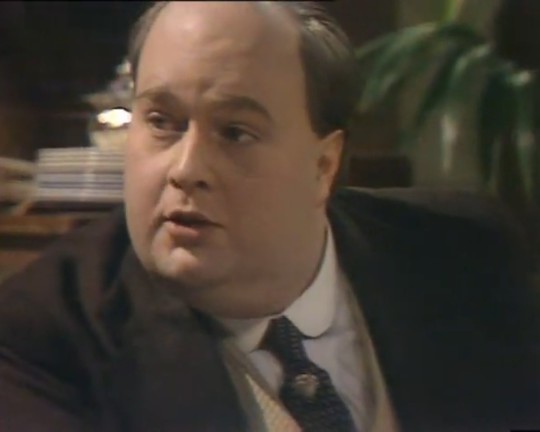
Late 1978, now William Hootkins is 30 years old and no denying the hair loss. He appears in all 3 episodes of the British miniseries The Lost Boys, about Peter Pan writer J. M. Barrie starring Ian Holm, presenting Barrie as homosexual and a pedophile (at least only in his mind). Hootkins plays Barrie's American friend, Broadway and London Theater Producer Charles Frohman.
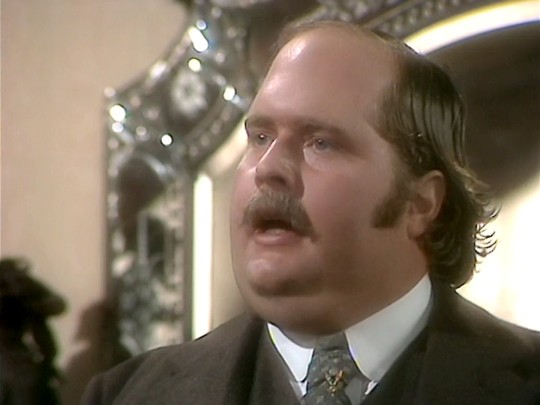

Hootkins appeared in one episode of British 13-part miniseries Lillie, the story of Lillie Langtry in 1978.

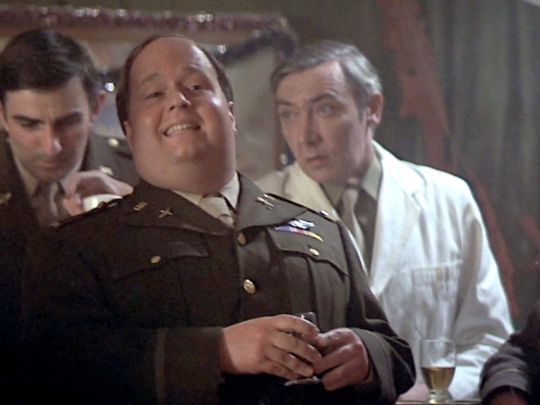
In 1979, Hootkins appeared in Hanover Street as Beef with Harrison Ford.
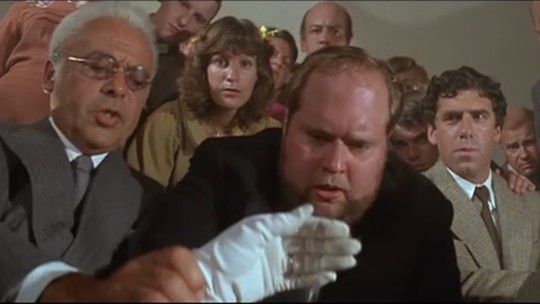
Also in 1979, he played a very small role in a remake of The Lady Vanishes with Cybill Shepherd and Angela Lansbury.
36 notes
·
View notes
Text
Charlie Cox: ‘I love being a superhero — I thought that ship had sailed’
Charlie Cox on the return of Daredevil, the joys of sea swimming in Dalkey and his rewarding character-driven work in RTÉ’s Kin
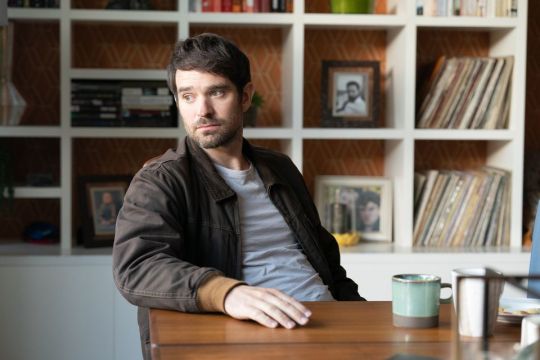
Kirsty Blake Knox April 27, 2023 (X)
Charlie Cox is a busy man; he smiles widely from the back of a car as it ferries him from a physical therapy session to the set of Disney’s Daredevil.
“We’ve just kind of started, it’s really great. Pretty intense, hence the physical therapy,” he says.
Cox has returned to play Matt Murdock, the blind lawyer-slash-superhero.
The show started life on Netflix and ran for three seasons before it was cancelled in 2018.This resulted in an online #SaveDaredevil campaign which resulted in 400,000 signatures begging Marvel to bring him back.
It took a little time; a contractual clause prevented any characters from the Marvel-Netflix shows from appearing in any non-Netflix projects for two years after cancellation.
And now Cox is suiting up again in his Spandex costume, running around punching people in the face and fighting for justice. It’s a demanding shoot — the series is 18 episodes long. And he is a fan of doing as many of his stunts as possible.
“I kind of get involved as much as I’m allowed to and is appropriate. Obviously, the stunt team are professionals and there are things they can do that I can’t even get close to,” he says. “I feel like the name of the game is to get as involved as you can… it makes the scenes more realistic.”
Cox took on the role, which had once been played by Ben Affleck in 2015. At the time, landing the role came as a shock.
“I never thought of myself as being appropriate casting for an American superhero. That never really occurred to me,” he says. “And in my 20s, a lot of my friends, and a lot of British actors, had gone and done that already. So when I got to 30 I was pretty confident that ship had sailed. I was very fortunate to get a character that I’ve now been playing for almost 10 years. It’s unbelievable.”
Cox is a father to two young children (seven and three) but they are a little young to fully grasp the role their dad plays in the Marvel Universe.
“I’m not sure they quite understand… One of the books we read him (his three-year-old) is called Superbat. A bat who is a superhero. But that’s his only real understanding. And so he thinks that I’m Superbat,” he laughs.
Cox realised he wanted to be an actor while in school and studied at Bristol Old Vic drama school. His first big break came in 2007 when he starred in Stardust alongside Robert De Niro and Michele Pfeiffer.
He has performed on the West End and Donmar Warehouse, in dramas like Treason and took on the role of Owen Sleater in Martin Scorsese’s Boardwalk Empire. For Irish viewers, we can see Cox on our screens every Sunday night, as Michael Kinsella in gangland drama Kin.
It’s pretty unusual for Marvel Universe actors to appear in a homegrown Irish drama. But Cox’s wife is executive producing the series. When another project he was attached to fell through, he read the scripts and felt compelled to be part of it.
“I’ve been working probably 20-plus years, and there’s a handful of times where I’ve read a script and felt like I’m reading something written by a truly brilliant writer,” he says. “And that quality of scripts never ceased. Sometimes you can get a really good pilot episode. But then as you get deeper into the season, some of the writing starts to disintegrate a little bit, but with Peter (McKenna) that was never the case.”
Obviously, the scale of production is a lot smaller on Kin than other productions, but he says these productions can be just as, if not more, rewarding to work on.
“If you have a limited budget, the way you handle that is you write long character-driven scenes… So weirdly, the lower budget stuff often is more appealing. Because you get to really get deep into the character and the relationships and the dynamics… it’s sort of like theatre. So, from my point of view, sometimes that stuff is more appealing.”
He continues; “I’ve learned I’m not precious about my character’s involvement. I don’t care much if my character does cool stuff … what I care about is, ‘are they moving?’”

He says this is some of the appeal of playing Michael.
“This life that he’d come from…and now he’s trying to rekindle a relationship with his daughter. [The] vulnerability, and the desire, and the need to fundamentally change his nature. That was really exciting to me.”
Cox perfected his Irish accent by listening to the voice of former Dublin goalkeeper, Shane Supple. He got up to speed with Ireland’s gangland scene by listening to podcasts featuring award winning crime journalist Nicola Tallant.
“I was kind of blissfully ignorant of the whole thing,” he says. “When I actually read the first two scripts, I just thought it was all fiction and then I agreed to do the part and I started doing my research. I was like, ‘oh, shit, this stuff is happening. It’s current and it’s happening right now.’”
Despite the violent nature of the series, he found filming and living in Ireland to be idyllic.
He and his family were based in the seaside village of Dalkey — where Matt Damon was holed up during lockdown. Cox became a sea swimming fanatic while residing there.
“I absolutely loved being there… I had conversations with my wife about moving to Dublin because I loved it so much. It’s not really viable with my job… Season one, we’re in lockdown. We lived in Hanover Quay, which was delightful…
“Season two, we moved to Dalkey. I felt like it was one of the best kept secrets in Europe… I was swimming in Vico every day… I found it to be like a haven. And I would love an opportunity to go back at any stage.”
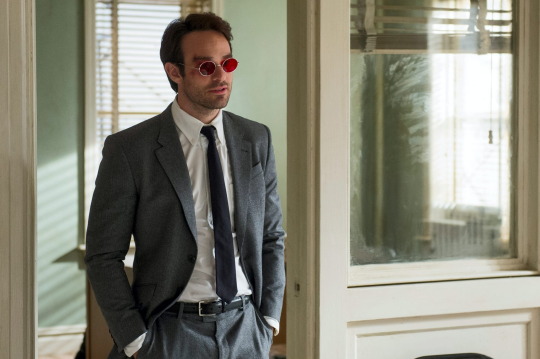
Cox is extremely polite and amenable. And modest — despite his success, Cox says he still suffers professional insecurities.
“I never think I’m going to be hired,” he laughs. “I read years ago that Christopher Walken always thinks his job he’s doing is going to be the last time he is hired. I don’t quite have that, but I certainly identify with it. I’ve never felt like ‘Oh, I’m always going to be hired.’”
He says this comes with some advantages, as it makes him more present.
“I’m filming in New York and I’m lucky enough that I’m still able to play a kind of a lead in a TV show,” he says. “You know, the time is ticking on that in a big way. And so I certainly don’t want to wish that away.
“It would be easy to kind of bemoan the amount of hours you have to work, and missing the family, but there’ll come a time where I would kill to be able to be the lead in the TV show. I think the trick is to really enjoy it while it lasts.”
As he makes his way out of his car and towards his makeup chair, I ask if he has any projects outside of Daredevil coming down the tracks.
“I’m going to be doing this until the end of the year. And then I’ll be back on the panic station wondering if I am ever going to work again,” he laughs.
~*~
#finally a new interview at last!!! 😁💗✨#I just spent the last hour running this through at least half a dozen applications to get around the damn paywall#I was starting to worry nothing was going to work 😬 but it finally came through \^.^/#charlie cox#michael kinsella#matt murdock#kin amc#daredevil#daredevil born again#interview#article
164 notes
·
View notes
Text
Principal Flutie is, I think it's safe to say, not particularly consequential to the overall plot of Buffy the Vampire Slayer. Appearing only in the first half of the show's first season and almost entirely outshone by his successor Principal Snyder, his main claim to fame is the grisly manner of his departure: getting eaten alive by a gang of hyena-possessed students. As I write this, there are 26 works on AO3 tagged with this character's name.
Kendra Young is the second ever vampire slayer to appear on the show, Called as a Slayer after Buffy Summers (briefly) dies in the first season finale. Meeting Kendra helps to persuade Buffy that being a Slayer is a part of who she is and not merely a job she can one day escape from; while the existence of multiple Slayers will go on to become an important plot point in the show's third, fourth and seventh seasons. As I write this, there are 199 works on AO3 tagged with this character's name.
Given the above, which of these two characters do you think:
appears in the most episodes?
is mentioned in the most episodes after their death?
was actually given a full name while the show was still airing?
Here's a hint: all three questions have the same answer.
Here's a less subtle hint: it's not Kendra.
Robert ("all the kids are free to call me Bob ... but they don't") Flutie appears in a total of four Season 1 episodes (Welcome to the Hellmouth, The Harvest, Teacher's Pet, The Pack) before he dies, and is then mentioned again in three episodes (Season 1's The Puppet Show and Season 7's Lessons and Beneath You).
Kendra ("I have no last name") Young [who, despite being very clear on the subject when asked, suddenly acquired a last name when she needed one for the Buffy RPG tie-in] appears in a total of three Season 2 episodes (What's My Line? Part 1, What's My Line? Part 2, Becoming Part 1) before she dies, and is then mentioned again in two episodes (Season 2's Becoming Part 2 and Season 3's Faith, Hope & Trick) before never being mentioned again [at least not on the TV show].
You might think it strange that the show's actual focus seems so out of alignment with both fandom interest and what logic suggests should surely be central to its own mythos and world-building and to its major characters emotional arcs. You might think it strange that, after Season 2, Buffy never talks about Kendra again [the one time Kendra's name is spoken in Season 3 comes when Cordelia says it] despite Buffy having found Kendra's body and being falsely accused of her murder. [Fun fact: after Season 2 those same murder charges are mentioned more times than anybody expresses any sadness over Kendra's death, which is never. Oh, sorry, that's not a very fun fact.]
You might think it particularly strange that in Season 7 -- a season where the Slayer Line itself is a key part of the central plot and we meet many new Potential Slayers who Buffy is tasked with training and keeping alive, a season in which the Big Bad has the ability to appear in the form of any dead person she wishes and there are multiple episodes featuring flashbacks to the life of a former Slayer who was killed by one of the Big Bads from Season 2 [albeit flashbacks that involved recasting the original actor despite her interest in continuing to play the part] -- the Buffy writers thought to include two separate callbacks to the unremarkable and (up to this point) unlamented Principal Flutie (who surely only a minority of fans watching would have even remembered?) and exactly none to murdered Vampire Slayer Kendra.
Was a character who appeared in four episodes six years ago really so much more memorable than a character who sppeared in three episodes five years ago? Did Kendra really make so little impression at the time? Was there no reason to think one of the characters might have brought her up at any point? Was there really no room at all in any of this season's scripts to include even a fleeting reference to the very first girl Buffy met, tried to teach how to be a Slayer, and who then died in a way Buffy could blame herself for? Might Kendra's memory not have been slightly more thematically relevant to this season's story than the tedious ongoing sagas of "is Giles the First?" [no], "will the First ever use the hypnotized Spike as a weapon against Buffy?" [no] and "isn't Andrew Wells funny? doesn't he deserve his own spin-off show?" [no]? Is there any reason you can think of that might explain this puzzling creative choice?
Ah well.
Who can say what the writers were thinking? I guess it's just one of those little mysteries that will never be resolved.
24 notes
·
View notes
Note
Hi! I come to you for advice, as I trust your opinion in matters like this. Me being just a casual viewer of war shows, not interested in it just for the genre, should I watch Masters of the Air or not? Thank you in advance! 💖
Augh, I answered this, then my browser crashed not helpful. Anyway, the gist of this is, I am not a casual war shows enjoyer, but I am going to do my best on this front given I know the one war show I know that we both enjoy.
tl;dr: I think MotA has good characters, doesn't sacrifice telling a good story for historical accuracy and I've watched it like, three or four times now already.
So actually yeah, I'd suggest giving MotA a shot. I will not be offended if you don't like it, but I do think it's worth it.
Longer answer under the cut (and sorry, I did get rambly):
While MotA looks from the outside as more of an ensemble piece, it's really about four guys, and two of those guys are a Set. It is also very historically accurate, but it doesn't feel like they got super hung up on that, they get the balance that this is still a historical fiction show.
They do change things up in places for the sake of the narrative. This doesn't always work, a couple of plot threads get dropped in what I feel are clunky ways. Honestly, I think they just tried to do too much and it meant some things didn't get the weight they needed. Still, I found it a mostly cohesive story and strong enough to follow each of our main guys.
Be warned though: there are timeskips a lot in the second half of the series. These are telegraphed quite well but can be a little jarring. This does cause some minor characters to appear to randomly disappear.
They also do not shy away from injury or other horrors of war, so be prepared for that. If you want fuller content warnings, up for that.
So really, it comes down to if you think you're gonna enjoy these four guys:
Gale "Buck" Cleven and John "Bucky" Egan
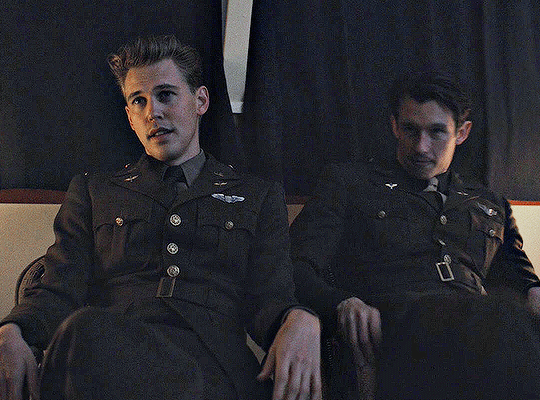
The very quick way to describe these two are the classic quiet guy/wild child pair, but I think that does them a bit of a disservice because there's depth to both characters that really gets borne out over the course of the nine episodes. Bucky gets a lot more to work with outwardly, but I think they're both gorgeous characters. Their love for each other and how it is tested and reinforced and drives them is a huge part of this show. Austin Butler and Callum Turner have great chemistry, and in both cases, there is a real solid presence of the other when they're in scenes alone. Loved their dynamic with each other and with the men they lead.
2. Harry Crosby
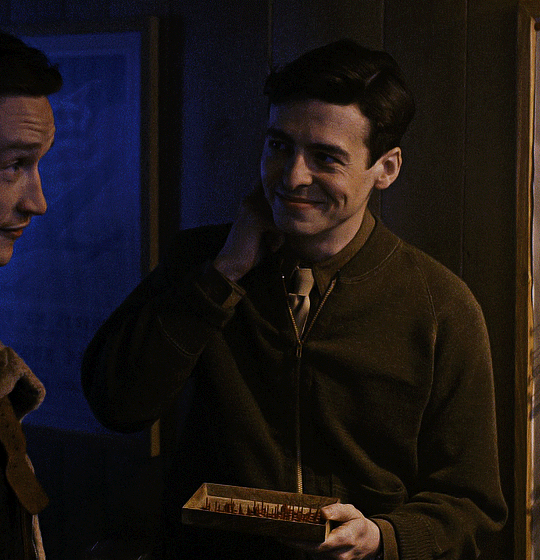
Understated protagonist. He also gets a great character arc over nine episodes. Anthony Boyle is incredible in the role and makes him one of the most likeable and engaging characters I've ever seen. IRL Croz wrote a memoir A Wing and a Prayer which is refreshingly frank and quite funny in parts too, and I think that really serves here.
3. Robert "Rosie" Rosenthal
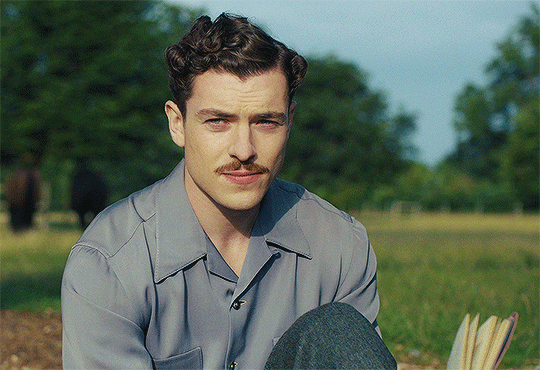
We don't get to meet him till a few episodes in, so he doesn't get as grand an arc as the others, but I think that works because we get to really hit the story of a guy who just wants to serve justice being flung immediately into an ongoing horror. We get to immediately contrast him with the guys who have been around longer. Also he's really beautiful and SO GOOD AT HIS JOB my God.
Also, while there are supporting characters, none of them really get the focus these ones do, so expectations should be managed on that front. That said, the actors are all great so I personally feel you do get a hold on who they are. Nobody expects you to know everyone's names. I am still only 70% sure I know who Murphy is.
(as usual, my favourite guy is a supporting guy but at least he gets some narrative explicitly discussing him and his job and also he's Raff Law so like, his face is distinctive).
Also Corin is in it for a couple of scenes so you should watch those if nothing else.
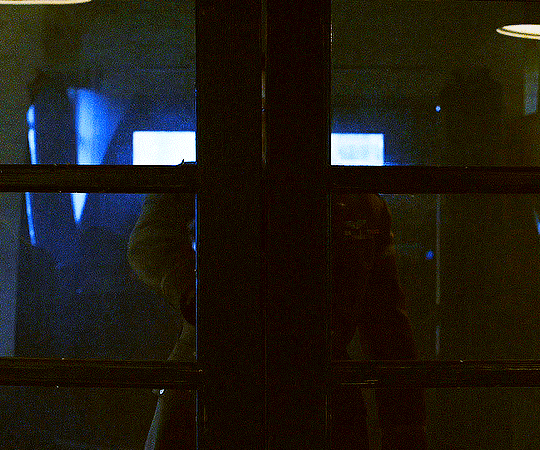
apologies for that getting long i love my boys but i also tried to be conscious of my war media nerd hat
20 notes
·
View notes
Text
you may have seen my previous theory on wtf is going on with john doe malevolent, but i have more proof this time to show for my hypothesis!
in episode one, we first hear someone turning on a radio, presumably in a car, listening to “You call it madness (but I call it love)” by Russ Columbo (not the 1946 version by nat king cole trio we all put in playlists lol), then arthur gain consciousness
afterwards, they are in bookstore when a radio starts playing the song again, the entity doesn’t see the radio, but he does recognise the song
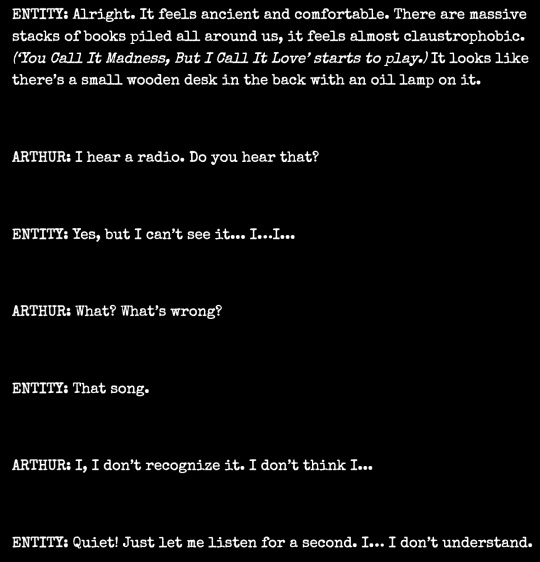
both arthur and the entity recognise this is odd, since atp the entity had only been in arthur’s body for 20 odd minutes
but, if you’re caught up, you’ll recognise that this is moment directly parallels a scene in part 33

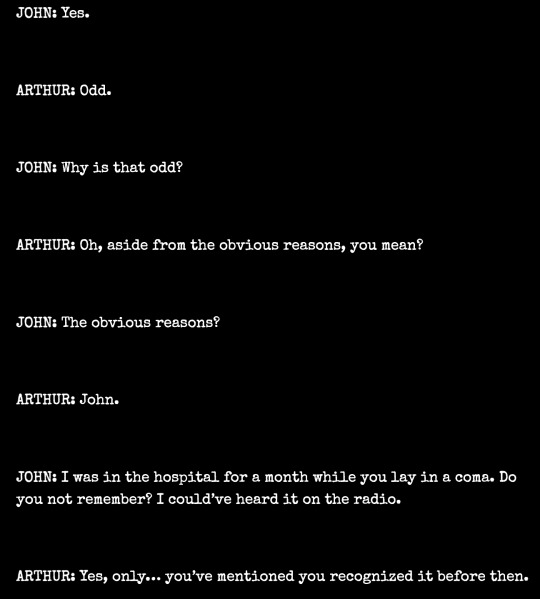
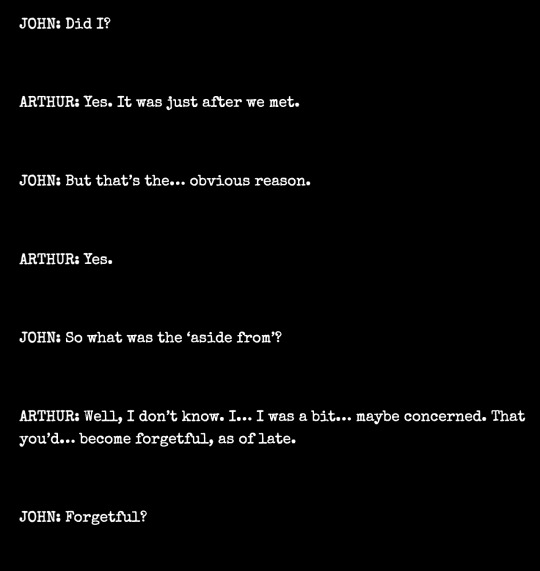
this, however is not the only time something like this happens. in part 5, john uses a turn of phrase
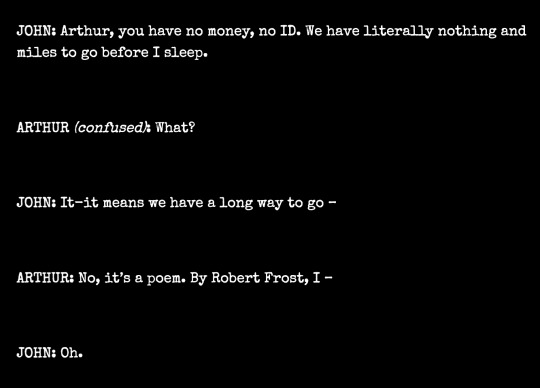
this moment is soon after arthur’s month-long coma, so unless lily had been reading robert frost to arthur (which john would’ve most certainly mentioned when arthur brought it up), he shouldnt have any way of knowing this sentence.
the first time we hear the poem in full is in part 26
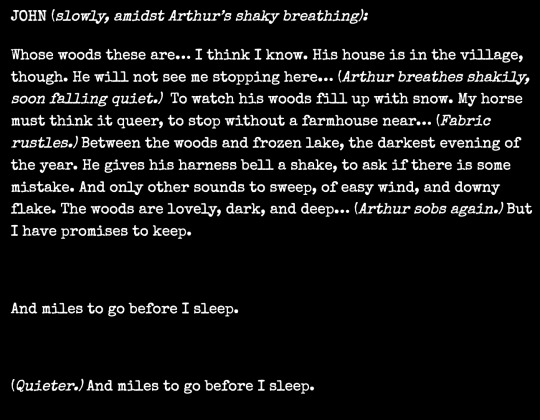
but even still, in the context of the moment, why does john know this poem? he’s had no moment since he came back to learn anything of the sort, even ignoring the time it’d take to memorise something like this.
before this, there are only two instances of 'miles to go before i sleep' appearing, once at the end of part 17 and just before arthur leaps of the edge in part 23

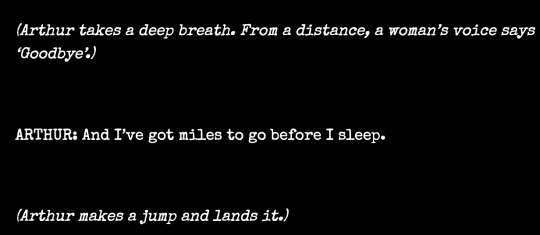
so now, my answer to all these questions is a bit weird.
in part 1, the entity says as follows regarding time in other worlds and the dark world as being timeless

which initially led me to reach the idea that john's forgetfulness in part 33 has to do with the time he spent away from arthur in s3, which he claims he does not remember.
i think he was actually sent back to the dark world and spent an indefinite time there, since there is none, causing him to forget finer details. but that raises leaves many questions unanswered, like why did the entity know the song before ever being with arthur?
i think it's time fuckery. the entity we see in part one could be some sort of future!john, at some point he could be sent back to the dark world indefinitely once more, than brought back via the book at a different moment in time that from which he left, the past.
this theory makes a lot of leaps, but it also gives reason to why john already knows call it madness and miles to go, i believe he might use both of these as some sort of anchor to not go mad himself in the dark world, thought he does end up losing parts of himself and of arthur. still, he isnt completely gone, which is why he's eventually capable of becoming john again
it also kind of explains the first sentence the entity ever says in the show

of course, on your first listen you assume he means what happened to arthur a few moments prior, but with the context of a timeloop, he could be referring to the whole shows events, even what we havent seen
later, when john says he doesn't remember who he is either, and arthur says

i understand that the entity knowing what he is might help them both, but it's still a weird thing to say. arthur has just woken up with a corpse and voice in his head, and acts like it's not his first time doing this? i'm not saying he'd remember, but it would make more sense if he was partially amnesiac to the future/past loops like the entity/john
also, i think it's important to distinguish the entity and john, the former being an amnesiac john who has only the potential to become john, but could just as easily become yellow.
last point is, obviously, also a massive stretch.
in part 9, after their first consequential argument (as in it nearly gets them imprisoned), arthur tells this fable to john
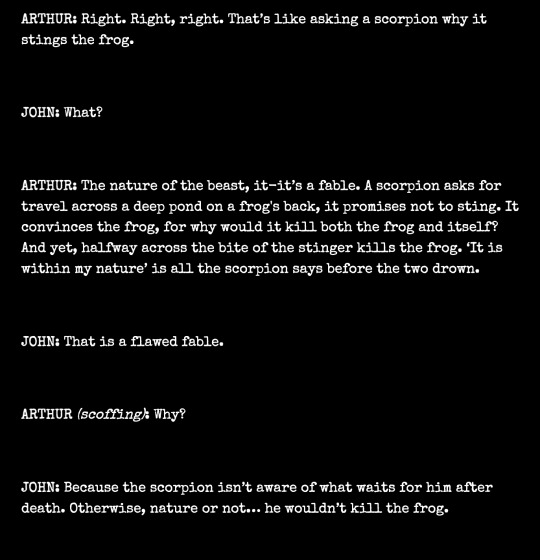
which yeah, could be foreshadowing john being the king in yellow in the s1 finale, but. it wouldn't make much sense since john doesn't permanently get him and arthur killed?
i think it goes like this, if it lines up with my theory.
john starts forgetting about the dark world, starts getting dicier and riskier with his and arthur's choices, whether it be about his deal with kayne or other future lies, but he pushes and he keeps pushing until both he and arthur meet their end. at some point, he gets himself sent back to the dark world and arthur killed/otherwise indefinitely unavailable, and as he does, he says "it is in my nature", so the last thing he tell arthur isnt sorry, but an excuse. perhaps they end on bad terms, after all he's promised to not let him drown.
he is left there to rot in his misery with only faint memories of his new self (significant moments, like him telling arthur the poem) and after he starts forgetting, a long time for a place with no time, he is pulled into the book in the past, eventually reaching arthur again. he might recognise arthur's voice, but he might not remember enough at this point, having turned back into the entity, no longer being john.
but hey. this is based on my relisten of s1 and little else. i love stretching the canon to make it make sense lmao
edit 05/12/23 — further proof i only now noticed in episode 30 “The Tenant”

#this could very well be the consequences of listening to woe.begone obsessively#i've started seeing timetravel everywhere.#malevolent#malevolent spoilers#malevolent theory#the dark world#john doe#arthur lester#john doe malevolent#arthur lester malevolent#john malevolent#arthur malevolent#malevolent john#malevolent arthur#unhinged aromantics#you call it madness but i call it love#miles to go before i sleep#robert frost#cant believe no one pointed the scorpion and frog thing out#like that's gonna be in every fanart i make of them from now on#the scorpion and the frog
74 notes
·
View notes
Text
Tidbits and bobs#1
Essentially my version of a lore dump
- All sentient machines, regardless of where they are built or their origin, believe in a singular deity named Lady. She is the station pilot for the Grand Terminus, the last stop for all sentient machines. Lady is seen as equal parts God and grim reaper and can appear in a multitude of forms, from locomotive to tug boat. She claims all sentient machines as her children and is believed to be very kind and gentle. This belief system has aspects of reincarnation, as it is believed that the soul of the machines shall be forged anew and come to incarnate a new form of vehicle or machine.
- Lady may choose a "guardian" to help with more earthly affairs on her behalf. It is unclear what they stand guard over, however.
- It is believed that Lady watches over the Isle of Sodor, as machinery built there seems to have a higher chance of sentience. However, this is both unproven and unconfirmed.
Ok enough lady stuff I just wanted to talk about her (she's neat)
- Thomas's route takes him all the way to Tidmouth and he often brings the townsfolk to their big city jobs.
- The official NWR freight engine livery is the green and red stripes, as worn by Henry and Percy.
- Percy has been requested as a guest of honor for at least 52 weddings and he has attended 34.
- The original Ulfstead Castle was destroyed in a landslide in 1991. The new Ulfstead Castle was built in 2000 and is part estate, railway, and museum, all orchestrated by the Earl of Sodor, Sir Robert Norramby.
- May 11th is Sodor Day, which marks the end of a week-long festival for all things Sudrian. Also, May 11th and Christmas Day are the only times the NWR intentionally reduces its services.
- In 2000, Sodor's Council passed a law allowing the marriage of sentient machines.
- The volunteers on the Talyllyn railway often send gag jokes or pranks to the workers of the SKR. The biggest prank yet was when they swapped Sir Handel with Sir Haydn (with permission from both the Thin Controller and the Talyllyn Preservation Society) and waited to see how long it would take someone to notice. Sir Haydn was on Sodor for 2 weeks and was found out by Duncan, who was suspicious as to why "Handel" was being so polite to him.
- Out of all the famous eight engines, Gordon is the one who dislikes his TV theme song the most. He claims that "it wasn't grand enough."
- Thomas's favorite TV episode is "Thomas and the Jet Engine." On multiple occasions, he has begged the Fat Controller to let him recreate the episode, just so he can say he is the fastest engine on Sodor.
- Edward is the unofficial father of Thomas, Bill, Ben, Rosie, Philip, and Ryan.
- Gordon is surprisingly good at giving advice. He has even given Edward some kind words.
- Boco is the official secondary for the Wild Nor'wester.
- Sodor is a sanctuary for sentient machines, and as such, Crovan's Gate Works can fix just about any type of machine in the world, whether it's diesel, steam, electric, gasoline, kerosene, or hydrogen. Bring them any type of motive power, and they can fix it in no time flat.
- During the purge of steam, Henry and later Murdoch often smuggled engines onto Sodor, attached to the ends of their freight trains.
#ttte#thomas and friends#ttte thomas#vivamus machinis#ttte au#ttte edward#ttte gordon#small author#ttte lady#gold dust#lore dump
20 notes
·
View notes
Text
My Favorite Villains Part 2 - James Gillies

Murdoch Mysteries, a Canadian murder mystery drama, is an episodic TV show set in Victorian Toronto. But like most shows that take on this nature, the series occasionally has overarching themes and recurring characters. James Gillies is one of them.
Gillies, portrayed by Michael Seater, first appeared in the season 2 episode Big Murder on Campus. Gillies is a polite, intelligent, and helpful young student who, along with his friend Robert Perry, assists detective William Murdoch in finding the killer of their physics professor Dr. Bennett.

As you might have guessed, this personality hides something sinister. A psychotic killer devoid of empathy, who uses his intelligence to kill. Not to gain anything or exact revenge. Just simply to kill.
But I don't think his politeness is deliberately placed as a mask, because he never drops it. Not after Murdoch finds he was behind Dr. Bennett's murder, not when he's being interrogated years after the fact, not when he's killing. All throughout the series, he remains the same. Never losing his cool, always well spoken. It's as much a part of his personality as is the urge to kill.
His intelligence is put on display throughout his numerous appearances. His ability to escape imprisonment and think of every detail to cover his tracks is impressive. Right from his first scheme, the murder of Dr. Bennett, this is evident. The perfect crime that no one could point to him. That is, except for someone of equal, or possibly even higher, intelligence.
This person is William Murdoch. Even if only one single crumb is left, Murdoch will not miss it, and he'll find the trail. He put the pieces together and saw past the facade of his helper. Had it been any other detective, Gillies likely would have gotten away with the crime. But either it was just luck, or he met a true opponent.

Gillies became obsessed with Murdoch. Every escape he made from jail, and every following crime, was done to get to Murdoch. He wanted to test him, to cause him pain. Over the years his schemes always put the power of life and death in Murdoch's hands. Whether it be to solve a mystery Gillies had orchestrated in order save another from being killed, or to murder one to save someone the detective loved.
Murdoch always outsmarted Gillies, though the battles were never easy. The two truly are very closely matched in their wits, from strategy to inventing.
Gillies is a very interesting character, one of my favorites from the series and one of my favorite villains overall. His dialogue and nature are entertaining to watch, and in some ways he acts as a foil to Murdoch in terms of intelligence. And though he finally met his end in season 10, I feel he went on his own terms as his pain from prior injuries brought him to his final stand.
Still, his ghost lingers in Toronto.
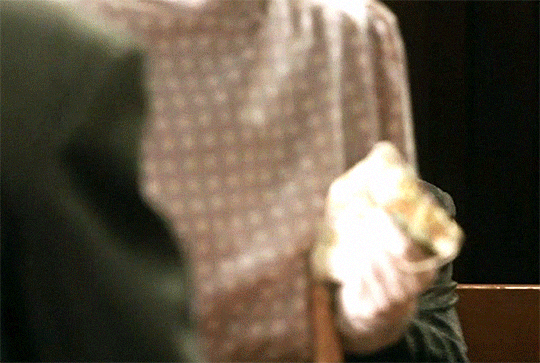
#writeblr#villain#villains#antagonist#murdoch mysteries#murdoch#james gillies#cbc#canada#canadian villains#canadian characters
16 notes
·
View notes
Text
The fantasy in modern Arthuriana (2)
This is a loose translation of Claire Jardillier’s article “Les enfants de Merlin: le merveilleux médiéval revisité” (The children of Merlin: Medieval magic revisited), for Anne Besson’s study-compilation.
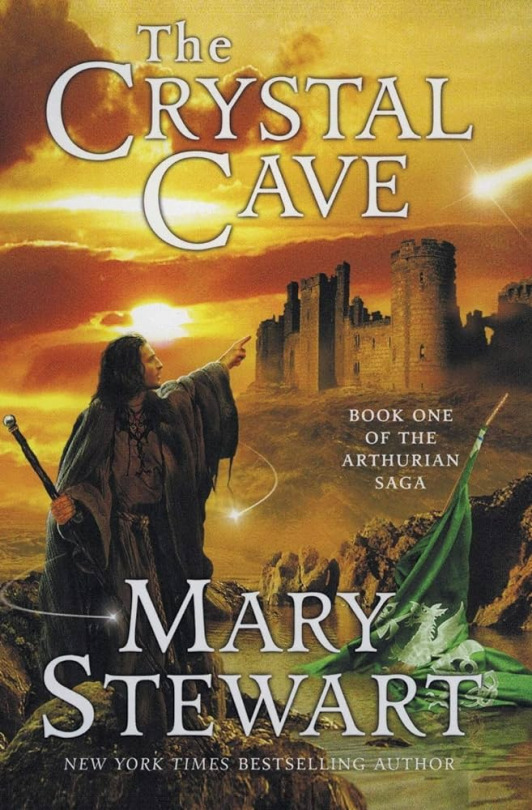
II/ Wizards and witches
The fantastical elements within modern rewrites are often embodied in the most visible way by a few key characters. First and foremost among this magical cast is, of course, Merlin the enchanter, but also regularly the bard Taliesin, despite his lesser presence within the Matter of Britain. Taliesin indeed only appears obviously tied to Arthur within the Welsh sources, especially “Preiddu Annwn”, where he is part of the expedition led by Arthur to steal away the cauldron of resurrection from the Otherworld. We can make the hypothesis that is it because of the historical rewrites of the Arthurian legends that the character of Taliesin gained such an importance, since it is in the Welsh sources that he is most frequently seen, sources that modern rewriters especially love due to judging them more ancient and thus more “authentic” and more Celtic than the chivalry romances and knighthood romans of France and England. Since Wales resisted more strongly to the Saxon invader, then to the Normand influence, modern novelists like to use the “Mabinogion” and the Welsh poems to historicize their Arthur. Taliesin usually stays within his traditional role of bard, in accord to the historical and bibliographical information we have about him. While quite brief, these information naturally designate him as the symbol of the Arthurian legend within a “realistic” rewriting, as a character between the history and the myth.
[In the “Hanes Taliesin” mainly, translated by Lady Charlotte Guest and which follows her “Mabinogion” translations, we discover the two births of Gwyon Bach/Taliesin, is exploits as a bard within the court of prince Elphin, and some of his poems. The historical Taliesin seems to have been a bard at the court of Urien Rheged during the 6th century, and the poems attributed to him were preserved within the “Llyfr Taliesin” (The Book of Taliesin). It notably contains the famous “Cat Godeu” (Battle of the Trees) and the previously mentioned “Preiddu Annwn”. These Welsh poems, like many others, were translated and published by William F. Skene within his “Four Ancient Books of Wales”]
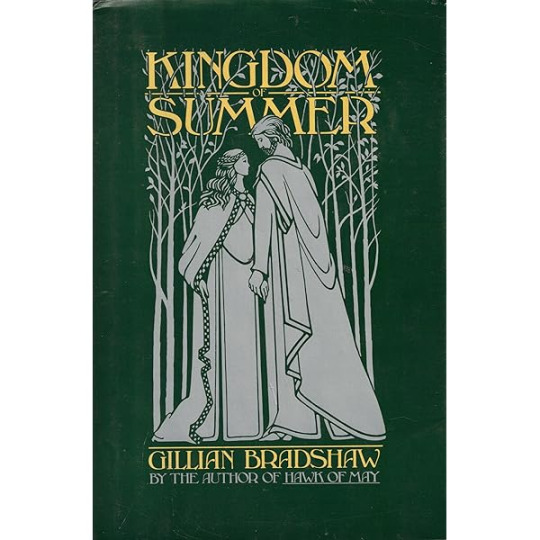
As such, within Fay Sampson’s “Daughter of Tintagel” cycle he becomes one of the five narrators that relate the life of Morgan. A first-person narration that give a voice to a secondary character of the medieval corpus is a fundamental trait of modern Arthurian literature : as such, we can hear Kai, Pelleas, Bohort, Rhys or Bedwyr, characters whose point of view is rarely given in legends, alongside the manifestation of more novel characters, such as Derfel, a shadowy warrior turned saint in the 6th century who narrates Bernard Cornwell’s “Warlord Chronicles”. [Respectively, Kai is heard within Phyllis Ann Karr’s The Idylls of the Queen and John Gloag’s Artorius Rex ; Pelleas within Stephen R. Lawhead’s Arthur and Courtway Jones’ In the Shadow of the Oak King ; Bohort within Dorothy Jane Roberts’ Launcelot my Brother ; Rhys within Gillian Bradshaw’s Kingdom of Summer ; Bedwyr within Catherine Christian’s The Sword and the Flame and Stephen R. Lawhead’s Arthur.]
Within Stephen Lawhead’s works, the role of Taliesin is more developed since he becomes the father, and so the precursor of Merlin (within Marion Zimmer Bradley’s, he is Merlin’s first incarnation). In his trilogy, the bard Talesin paves the way for Merlin, who will surpass his father in his role as the companion of the major hero, Arthur king of Britain. It is precisely this dimension that is often used by modern Arthurianists. [Stephen R. Lawhead wrote in reality five novels, the last two being a flash-back to episodes from between book 2 and 3. This Arthurian cycle is especially concerned with the questions of filiation, legitimacy and predestination. As such, Taliesin announces and foreshadow the coming of his son, a sort of messiah for the Britons, but Merlin himself works for the coming of Arthur, the savior of Britain as much on a spiritual level (the writings of Lawhead are distinctly Christian in tone) as on a political level. It is probably why we also see here a weird and exceptional element introduced, as Arthur is made the posthumous son of Aurelius, and not the bastard of Uther. Here Arthur is the product of an union blessed by the Church, and as such he descends from the first High-King, not from his replacement out of a “side-branch” of the family.]
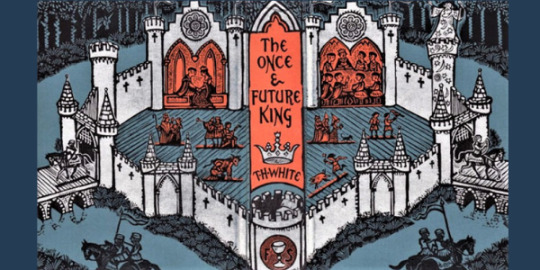
We also have to note that modern rewrites love to tell what happened during the life of characters in the form of prequels – in this case, the youth of Merlin, which is rarely detailed in the Middle-Ages outside of his birth and his encounter with Vortigern. It was the case within Mary Stewart, the first author who was concerned with the wizard’s youth, and who sems to have deeply marked modern Arthurianists, since the same pattern can be found in other novels, including those of Stephen Lawhead. This concern with “what happened before” is not exclusively Arthurian, and can be seen within other contemporary sagas – Star Wars, Indiana Jones, Blueberry… It is a tradition as old as the various “Childhoods” texts of the Middle-Ages. [Mary Stewart wrote “The Crystal Cave”, “The Hollow Hills” and “The Last Enchantment”. As a proof of the intertextuality of Arthurian novels, “the last enchantment” is an expression reused and exploited by Bernard Cornwell in the last part of his trilogy, where a dying Merlin, entirely devoured by his own student Nimue, preserves a “last enchantment” to allow Arthur and a few others to escape the battle of Camlan]
Be it Taliesin or Merlin, the first way the question of the magic implants itself within the narrative device is about the relationship between the king and his wizard. The magical element is thus tied to the political power, weighed down by a reality which, if not historical, is at least coherent. This heirloom is directly tied to the medieval sources, even if it is not obvious at first. The idea of an Arthur raised as a boy by Merlin owes much more to T.H. White’s “The Once and Future King” than to the medieval texts, where only a slow and complex evolution allowed the association of those two characters now seen as undividable. [White’s work is a set of five novels, first published separately, then compiled as one work in the 50s, and to which the last novel, The Book of Merlin, was added in 1977. This work is a precursor of all the rewrites that happened from the 60s onward, especially the first book that tells of Arthur’s childhood and his education by Merlin. It was a best-seller, and the adaptation of this first novel into an animated movie by Disney (63’s The Sword in the Stone) amplified its impact]. Indeed, within Geoffroy of Monmouth, Merlin and Arthur follow each other in the text… but never meet. It was within later rewrites, Wave, Lawamon, and in the French “Lancelot-Graal”, that the king and the enchanter will develop a more intimate relationship, culminating within Malory’s Morte Darthur. [In Geoffroy’s tale, the two characters at least never meet within the context of the tale. A doubt is allowed since in most of the manuscripts, Merlin makes a brief apparition at the very end of the “Historia”, where an “angelic voice” talks to Cadwallader, telling him that “God wishes that the Britons stop ruling within Britain until the moment that Merlin prophesized to Arthur” ; this sentence implies that Merlin might have been the king’s prophet, a role that will become more and more obvious in later rewrites]
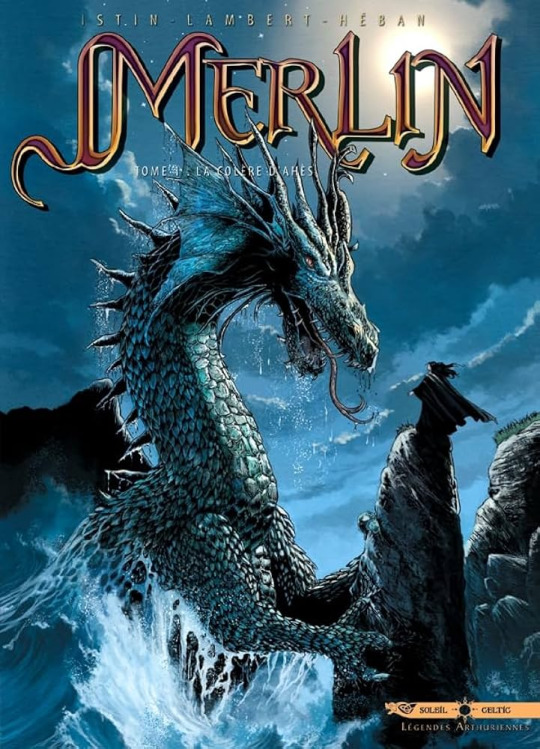
This is due to the two characters, Merlin and Arthur, originally belonging to two distinct traditions. Once they became connected thanks to Geoffroy’s Historia Regum Britaniae, the two characters got closer and closer, and gained many interactions, just as Merlin’s interventions became more and more fantastical. This is very clear when we look at an episode shared by all the medieval Merlinian tales: the moving of the stones of Ireland to create Stonehenge. Within Geoffroy’s, it is a mechanical process. Within Wace, an unexplained way. Finally, within Lawamon, it becomes a powerful spell that makes the stone “as light as feathers”. Modern authors follow this tradition and often reuse this episode, or a similar one, in what we can call “the motif of the dancing stones”. In the same way, within Lawhead’s novel, a child Merlin proves his powers to an assembly of druids by making the stones of a cromlech levitate. Stonehenge plays an important role for Cornwell: it becomes the place of a ghost-filled ceremony during which Merlin gives Excalibur to Arthur. Even among comic books, Merlin makes stones dance before amazed mortals. [It is within the first volume of the BD series “Merlin” by Jean-Luc Istin and Eric Lambert, “La colère d’Ahès” (The Wrath of Ahès). The dancing stones of Istin and Lambert are quite similar to the ones described by Lawhead, and the scenarist confessed having read the “Pendragon Cycle”. We find in this “Merlin” the same habt of syncretizing religions as within Lawhead’s works (father Blaise is a former druid, and offers Merlin as a symbol of the union of religions).]
We find back here what we said before: the historicized Arthurian literature of the 60s-80s greatly deprived the medieval text of their fantasy, and since the 80s-90s we have a slow re-appropriation of the medieval magic within novels that still, however, wish to be historical. In other terms – the stones are dancing again, but they are always dancing in a mentioned 6th century.
Before Lawamon, Merlin only acted during the lifetime of Aurelius and Uther, before disappearing for no reason after Arthur’s birth. However, the encounter between those two historical characters was too tempting to be avoided, and we can see a true shift between Geoffroy and Malory (for example), which today leads to the many tales in which Merlin acts as the teacher, tutor, or even adoptive father of Arthur. This filiation is helped by two elements. On one side, that is an elliptic moment covering Arthur’s childhood in medieval texts, and we go from him as a baby to him as a young fifteen-year old king. [We find within Lawamon the beginning of an explication: child-Arthur was raised by elves at Avalon. This idea was reused by Parke Godwin within the novel “Firelord”.] On the other hand, we can see that all of his next of kin die around the same time. In front of this absence of parents, it is very tempting to remove Ector (the father of Kay and the tutor of the royal child in the tradition) and put in his place a more familiar and impressive character, Merlin the wizard.
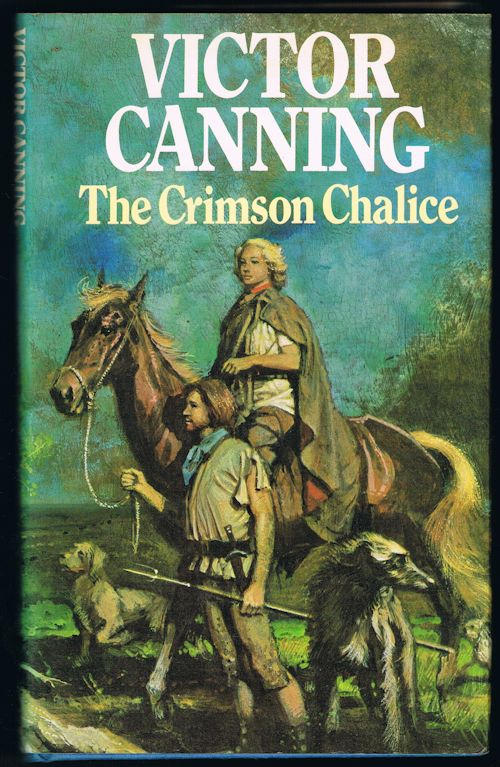
We talked before of the habit of “prequels”: the cyclical temptation of modern novels, which in a way mimics the Arthurian medieval tradition of a condensed and fractioned writing of the whole Arthurian legend (usually in three volumes), favorizes the writing of the origins, of the “before Arthur”. The introduction of Merlin, but also of Taliesin, proves this attraction for what Anne Besson calls an “Arthurian prehistory”. For Stephen Lawhead, the link between the various generations (Taliesin, father of Merlin, Merlin spiritual father of Arthur) insists upon the greatness and the predestination of the king of the Britons, the bearer of Light. Even when the Arthurian tale is limited to a single novel, it is not unusual to see it begin with the generation before Arthur: it was the case with Victor Canning’s “The Crimson Chalice”, where a third of the novel follows the events that led to Arthur’s birth (even though here Arthur’s parents are named Tia and Baradoc, and bear no resemblance to Igraine or Uther).
To all the reasons described above, we must add the fictional temptation of having characters coexisting to allow a powerful confrontation. But this temptation also bears a prevalent trait of the modern Arthurian fiction, and of its dialogue with the sources. Indeed, it is not uncommon to see a rearrangement, to various degrees, of the links that traditionally unite the characters. As such, in most sources Ygerne is the wife of Gorlois and the mother of Arthur, but she can be his half-sister and the mother of Medraud within Rosemary Sutcliff’s “Sword at Sunset”. The same Ygerne becomes Gorlois’ daughter, not his wife, in Stephen Lawhead’s work, as the author plays with the writing of the myth, has his Merlin-narrator laugh about the mad rumors that circulated about the siege of Tintagel “I have even heard it said that Ygerna was Gorlas’ wife – Imagine that!”). The marvelous does not escape this kind of more-or-less extreme shifts: the case of the female characters, of their relationship to magic, and of their role within history is especially revealing.
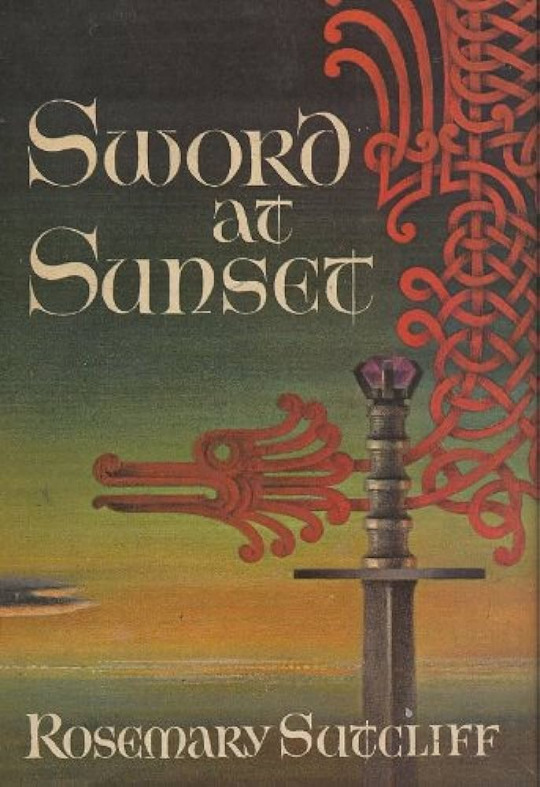
#arthuriana#fantasy#arthurian novel#fantasy novel#arthurian literature#translation#merlin#king arthur#taliesin#magic#arthurian rewrites#merlin the enchanter
10 notes
·
View notes
Text
I think a reason why people enjoyed Cersei more than Alicent is probably just the honesty that she brings. (ironic, ain’t it?) Cersei knows exactly who she is and what she is, she’s not pretending to be a good person, she’s not morally bothered by the suffering of others even when caused directly by her, and she cares for no one other than her twin and children. What’s interesting about her is that unlike Alicent, Cersei expreses love to her children more often, she’s very vocal about not sending Myrcella away to be shipped off ‘like a broodmare’ as she herself once was. From what I’ve seen, there isn’t one scene of Alicent expressing love to her children, and I mean love, motherly love, not polite smiles in the public eye. There’s a scene where in private, she’s bouncing a crying baby Helaena with an emotionless expression. She talks to a teenage Aegon in a way that Cersei never talked to Joffrey (though if she had, maybe she'd have more control over the little monster). Then again, both boys turned out to be bad apples after a while.
The only scene we get of her being protective of her kids was when Aemond had his eye taken out and then when she hugs older Helaena in episode 8 (as well as when she instantly tried to hold her after Daemon sliced Vaemond's head off). Even when she's mourning the loss of her sons eye, she berates and blames Aegon for not being there. A situation he had nothing to do with and didn't know a thing about.
It's interesting because as far as we know, they were in loveless marriages from the start. Yes, Cersei says that she did love Robert in the beginning until he called her Lyanna in bed during their first night together. After that, she hated a him, a dead girl, and I'm assuming the entirety of the Starks in general. And while Alicent actually enjoyed her time with Viserys, she didn't wish to marry him. I assume Cersei didn't wish to marry Robert in the beginning either as I remember the scene where she begs Tywin, "Please, father, don't make me do it again." when he brings up her engagement to Loras Tyrell. And yet, Cersei loved all her children while Alicent appears to not even like hers.
Yes, you might bring up that her three kids were Jaime's, not Robert's, and that's a big part of why she loves them (which is also an extreme form of self-love and narcissism, loving your twin and your children being extensions of yourself thus they're the only thing you love). But, Cersei's first baby was actually Robert's, the baby boy that died a few days in. And she loved him with all her heart. The thing about Cersei and her children is that she doesn't even see them as Jaime's either, to her, Joffrey, Myrcella, and Tommen are all Cersei's children, no one else, not Robert's and not Jaime's, just Cersei's.
When it comes to Alicent, you'd think the one thing she could find to love from a loveless marriage would be your own kids. I do think she loves them in a way of course, but I think it also comes with how everyone expects mother's to burn everything to the ground for their kids safety. We see that in episode 8, she's a lot more gentle and loving with her daughter and in part even more furious with her son, verbally (but not literally) disowning him, "You're no son of mine." after she finds out that he raped a serving girl. Another thing about this episode and this time jump is that (as the showrunners told us), in the last six years, Alicent has tried to repent her actions by focusing herself with religion. She even had dozens of ancient Targaryen tapestries and statues removed and replaced with the seven star of the Seven. I think that in finding more of a home in religion she also tries to adhere to the Mother's values, trying to be a better one to her kids, and while we see no interaction between her and Aemond in this, and she (rightfully) tells Aegon to fuck off, she's actually progressed with Helaena in her motherly ways (though she is the easiest one to get along with, we love Helaena in this house).
Still, back to it, the reason people enjoyed Cersei more was because she didn't lie when it came to being the villain. She doesn't attempt to be a better queen, or well-liked because it's never been one of her stronger talents— something she especially loathes Margaery for. She already expects to be disliked so she loathes the people automatically. She makes plans to have her husband killed, has no problem seeing her brother die, doesn't care if the women around her will be raped, and enjoys tormenting young Sansa.
When it comes to Alicent, she isn't an inherently evil character. We met her when she was young, and we saw her father groom her to distract and marry the king, a king who she grew up around and probably thought of as a second father (who's also her father's age). And she bears his children, her friendship with Rhaenyra suffers, and she feels alone in court. Naturally, we pity her and understand why she's suffering. But when she finds Rhaenyra has 'lost her maidenhood' not to Daemon but to Crispin Cole, she's declaring their friendship over, no more mister nice guy. From then on, in the next ten years she's developed harshly and judgmental. She orders to see baby Joffrey the second that Rhaenyra pushed him out, and no one can refuse the Queen. Larys Strong kills his father and brother just to get Otto Hightower back and while she is visibly shocked and guilty, she does nothing to set it right. She talks about decency and honor winning, but where's the honor in kinslaying? She removes ancient and traditional Targaryen art from the walls, the statues, and the Red Keep looks like a hospice compared to the lively emotion set in the first episode. She replaces everything with the Seven, trying to find penance in holiness because she knows what's happened was wrong. And yet, she won't speak a word of it. She calls Rhaenyra's children bastards and wild beasts like those dragons they ride while her children are actually far worse. She believes that her children are better purely because they are trueborn.
Cersei believes her children are better because she just does. They're her kids and so they must be. Alicent is in a similar position that Cersei will be in the centuries to come, but Cersei doesn't lie about how much of a terrible person she is. Alicent does, "Exhausting, wasn't it? Hiding beneath the cloak of your own righteousness. But now they see you as you are." Alicent believes that because she followed the rules, had trueborn kids, and didn't have an ounce of happiness that she's the better person in this. That she's not terrible. I wonder if she'll ever realize how far she went for a family that she doesn't even like.
#house of the dragon#fuck me and fuck this essay#hotd#alicent hightower#the greens#cersei lannister#game of thrones#aegon ii targaryen#aegon ii#helaena targaryen#aemond targaryen#rhaenyra targaryen#viserys targaryen#joffrey lannister#myrcella lannister#tommen lannister
168 notes
·
View notes
Text
Let's talk about respect for each other, dear fans of "Treasure Island" by David Cherkassky
(although I recommend that other fans of the film/cartoon adaptations of Robert Louis Stevenson's novel join in).
Before I start talking about the problem in the Russian fandom of Treasure Island 1988, I want to say: I am Russian too and I am writing this not because I am an offended foreigner, but because I am ashamed of you all (this is a message to the fanatics works of Cherkassky).
The fact is that I noticed one interesting detail that helps to distinguish the Russian Internet from the English one. On the English-speaking internet, I feel comfortable saying that I like Takarajima because I know that most people will react either positively or neutrally. But on the Russian-language Internet, I need to conduct a fairly long search to find a person who will not judge me for loving anime. On the Russian Internet, treating someone neutrally or respectfully is considered a new fashion...

I don’t feel like I’m part of the Russian-speaking fans of the 1988 film adaptation, since I also love other film adaptations of Robert Louis Stevenson’s novel. And this is... strange, because in theory we should share our love for various cartoons and films, and not beat those who love other works or are afraid of being beaten.
I have often come across the opinion that David Cherkassky is a genius and that only his version of Treasure Island is correct. I've often read that fans of 1988's Treasure Island think other adaptations from other countries are weird. I have often come across the opinion that there is only one correct and good film adaptation of Stevenson’s novel.
And I'm sick of it all.
Man who is over thirty years old and who calls children idiots for unfunny memes about your favorite cartoon, I am addressing you and others like you. I appeal to all those who cannot see what even blind Pew would see.
THERE IS NO CORRECT OR IDEAL FILM OR CARTOON ADAPTATION OF "TREASURE ISLAND"!
In the entire history of cinema, there has never been a perfect adaptation of Robert Louis Stevenson's novel that everyone liked.
And now I will prove it:
The 1965 adaptation may seem strange in terms of plot, instead of people it's all animals, and the ending is different from the ending of the original story;
The 1971 adaptation left virtually nothing of the original story;
The 1978 adaptation often deviates from the canonical development of events in order to stretch the runtime over twenty-odd episodes;
Treasure Planet 1982 is a drug trip for everyone who worked on this cartoon (the budget for this cartoon is three packs of cocaine and marijuana, I'm sure of it);
The 1988 adaptation is a comedy based on the novel, which did not include enough characters (for example, Jim's parents remained somewhere off-screen) and events;
Legends of Treasure Island (1993) is a mystery series where events from Stevenson's novel appear less and less as the series progresses;
The 2002 DVD adaptation is not particularly pleasing with its cheap animation and character reactions (some people find the film adaptation rather boring and faded);
Treasure Planet 2002 may not appeal to some due to the space setting and decisions related to the characters (for example, not everyone will appreciate the fact that Smollett became an alien catwoman and that Livesey and Trelawney were combined into one character) and plot.
However, all these cartoon adaptations also have advantages:
The 1965 adaptation has an interesting twist on how predators have to hide their real selves. I'm talking about claws and how they have to fight the urge to walk on two legs. This also explains why the bones in the chest are treasure to them;
What may be interesting about the 1971 adaptation is that it deviates greatly from the original book;
The 1978 adaptation boasts beautiful stills that you wouldn't be ashamed to frame on your wall, and a soundtrack that might make some people cry ("Oh yes, yes! Play that violin even harder! I want to hear all your skill in this composition!! Ah~");
1982's Treasure Planet appeals to some people precisely because it's quite weird. “So bad it’s good” is how you can describe it. Character design and weird animation can also come in (I like Jim);
People like the 1988 adaptation due to the ease of storytelling, fun and vivid images of characters that you will not be able to forget. I also like it because it teaches the right things, for example, they say that smoking and drinking are harmful to human health (thanks to these songs, I don’t consider smoking and drinking alcohol something cool);
Legends of Treasure Island 1993 can help people relive their innocent childhood and forget about reality for a while. There are violent moments and interesting plot developments that are fun to follow;
The 2002 adaptation follows the book almost exactly. Jim is still a good boy and he, like the others, is not annoying (considering the quality of the picture, this could have happened, but did not);
Treasure Planet 2002 is interesting to watch, at least because it combined the 18th century and the theme of space. Because of this idea, we have a unique product about space, which is unique among all others. As a person who doesn’t like the theme of space because of monotony (the theme of modernity in any work is not interesting to me, just like the future), I admit that wooden ships in space captivated me.
And this is without even mentioning the other cartoons and films based on the book (and there are a lot of them)! But I think that it has already become clear to you that everywhere and in all film adaptations, in addition to the bad, there is also good. I know I haven't talked about Treasure Island from the Muppets or McDonald's, but the fact is that I haven't watched them yet. I'll definitely watch everything!
However, my goal was not to talk about all the film adaptations of my favorite book - my goal was to show that you can find at least one more film adaptation of Treasure Island that you like.
However, my goal was not to talk about all the film adaptations of my favorite book - my goal was to show that you can find at least one more film adaptation of Treasure Island that you like.
And before I finish writing this post, I want to offer you three simple rules that, if followed, can reconcile fans of different “Treasure Islands” (I hope they'll work).
And these three rules sound like this:
1) Read the original novel by Robert Louis Stevenson (not a summary, not a short version of the book, but the whole story);
2) Watch other cartoons and films based on the book and find those film adaptations that you like to talk about;
3) Treat other fans of the book and/or any other film adaptation with respect if they behave appropriately.
That's all, dear readers. Thank you for reading my post. You can safely express your opinion in the comments, I just ask you to write calmly and adequately. What's your favorite Treasure Island adaptation? What other cartoon or anime do I not know about?
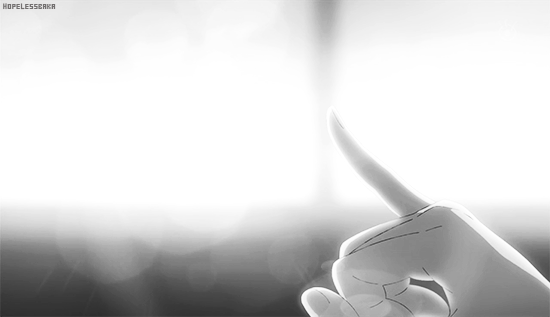
#treasure island#anime treasure island#treasure island 1978#treasure island 2002#treasure planet#планетата на съкровищата#остров сокровищ#treasure island 1965#shin takarajima#takarajima#legend of treasure island#планета сокровищ#treasure island 1971#treasure island 1982#treasure island 1988#treasure island 1993#легенды острова сокровищ#宝島#Russian Internet#English internet
52 notes
·
View notes
Text
A Tale of Two Triguns
Or, How I learned to Stop Worrying and Love the PLANT
Hello out there. I recently finished up watching Trigun: Stampede with a friend, after having a rather viscerally negative reaction to the first episode. Well, I've come here after watching the whole show to say that it doesn't get much better. My ramblings below were meant to be sent to a friend initially... but I had so much to say I figured that a blogpost would be easier to share around my frothing rage. So if the prose starts rather garbled and stream-of-thought-like, I apologize, but bear with it to the end, or at least as long as you can stomach.
So, the show is a mess as far as a timeline goes. Looking at it compared to the original, there are similar beats, but they don't line up right. And the show is trying to tell the Vash vs Knives story, but in a garbled way. To spoil it, the entire 12 episodes is a small timeline of events that happen in the original show. The problem is that aside from the overarching event, everything else is wrong. It could be trying to tell a prequel to the original, but if that's the case then they didn't do a good job because plenty of plot points from the original are in the prequel. Vash encounters a number of Gung Ho Guns that he would meet in the original show, not to mention meeting Meryl and Wolfwood, all before the event in the city of July. So, if it's intending to be a prequel, why does it just throw in a bunch of extraneous details?
Speaking of extraneous details, the new show has a cultish obsession with the lore of Vash the stampede. Not who he is or what he's done. In truth, Vash accomplishes very little in the realm of deeds, that aren't done off-screen or talked about as past heroic actions. But the show absolutely loves to talk about and involve the Sci-Fi parts of the original show in all facets of the new show, including adding special powers to Vash and Knives. Episode one has Vash save a PLANT that's going bad somehow. The nutty thing is that, despite the increased focus on PLANTs and Vash and Knives as weird offshoot PLANT entities, the new show explains very little when it matters. At one point near the end, a scientist man just asserts that the PLANTs are energy sources because they're conduits for accessing a higher plane of existence. Out of nowhere. He also "Explains" that Vash somehow has the ability to access that higher plane. This is only an explanation of why Vash's arm was consumed by a black hole in an earlier episode, it's never talked about as to why Vash has the power to do this while Knives, who is also an "independent plant" as they describe, cannot. This is one of many examples of the show treating PLANTs as some kind of common knowledge while really flippantly, if at all, discussing what they are and why they are around.
On the matter of not explaining, and to touch on the earlier issue of "temporal problems", the show has a nasty habit of progressing story beats off-camera, to an almost baffling degree. To give a few examples, Meryl and her partner (The infuriating exposition reporter "Robert De Niro") are marveling at vegetation in a biodome, and robert wants to go find a smoking area. The scene ends, the episode continues on. two scenes later, Meryl and Robert are in the middle of the PLANT storage facility, in….. somewhere. It's never shown how they got there, they simply appear. Hilariously, both characters don't know how they got there either, and since it's never addressed it's almost as if the storyboard itself shunted these two hapless side characters into the next exposition dump scene without them knowing. That's perhaps the most blatant example, but little fragments like that happen constantly. A character blows up, end scene. An episode later he's shown with bandages on him, so apparently he survived. In that same episode a child falls out of Meryl's grip in a static shot, then the shot ends. Come episode end, he's bandaged up and wounded somehow. It adds up to the show being a disorienting mess to watch at times, there's just too many blocks of missing time seemingly hacked out of the plot.
Oh, and the plot. The wonderful plot. So, this is already a spoiler talk, for both the new show and the original, but this is where I really burrow into those details so if you really don't want to be spoilered, stop here. The plot is a topsy-turvy mess that can't seem to muster up the brainpower to make sense of it's own details. The opening of episode one reminded me of the first star wars prequel. That's a great sign…. Anyhow, you meet the twins when they're young, at the Big Fall event where the entire Seeds project fails and crashes to earth due to Knives' meddling. How did he meddle? Guess. No I'm serious, the show simply states that Knives did it somehow, and apparently Vash "gave him the passcode" which makes him "an accomplice" which is it's own infuriating mischaracterization, but we'll get to that. So, Knives crashes all the space ships because "humans bad." After that, Vash runs away, and that's the last we see of (new) flashbacks for a while. They love to use the same flashbacks so the first few episodes have kid Knives saying "Vaaaaaaaaaaaaaaash~" in his silly voice, which is an amusing anchor point. Not amusing in a good way. Every flashback is a sore reminder of how awfully they're piloting the show.
Now right off the bat, the show has problems because it's trying to fit in references from the original show in a season that's half the size. Our first nostalgia story is Vash Vs the Nebraska Duo, which starts out much the same. Unfortunately it starts out under different circumstances that make it a more infuriating ride. In the original, Vash saves a diner from some small-time crooks, driving them out and receiving a free meal as a reward. However, upon realizing that he's Vash, the 60 billion Double Dollar outlaw, the town decides that they can turn in this relative stranger for a huge reward. The diner owner, who I believe is named Rosa like in the new show, says she feels sorry for doing it because he seems nice, but the town needs the money to survive. Antics ensue, because this is the og Trigun, and Vash is still his happy-go-lucky normal self. The Nebraksa Duo come in, hold the town hostage, and Vash swoops in to save the day, even after they all collectively tried to kill him. This warms the peoples hearts, how sweet etc etc. now, onto the new.
The storybeats are the same, with Vash saving the town… but here the ship leaves port, drifting away from believable into wishy-washy emotional gobbledeegook. So, episode one Vash saves the town from July police officers there to arrest him. The officer, for no real reason other than to show off a big flashy budget, fires a cluster missile into the air that breaks apart and will scatter all over town with bombs, destroying probably the entire area, PLANT included. Vash saves the day, though he does so in the rather ludicrous method of throwing a rock at a cluster of missiles wide enough to saturate the town with shrapnel, then shooting the rock so that it spreads and somehow air-explodes the whole cluster missile payload. Again, it seems to just want to be flashy, and having any sort of sense or logic isn't a concern. So, Vash is the hero of the town, and they all celebrate. Now, before I say this next story beat, Rosa, the tavern owner now, explains that, in addition to him just now saving the town, Vash also came by sometime in the past to save their plant. So that's twice he's saved the entire town out of pure charity. So, they decided to hold him up for ransom. The given reason is…. the same, they need the money to survive. What? No, seriously, what? They don't explain anything, Rosa just says she's a mom and has children and needs to feed her kids. So they're going to cash in 60 billion double dollars… for groceries. They can't be using the money to fix the PLANT, because Vash fixed it already, for free. And if the power structure around it was failing and they had to make repairs Vash couldn't do, then… why not say it? They don't, they just do it because this is the "town tries to ransom vash" episode. Antics ensue, although much more toned down (in tone, not in wacky spastic animation) antics this time around.
More differences come as the Nebraska duo show up, and instead of Vash escaping the town, they catch him, and the Nebraska duo decide to just steal him and take the bounty. A short lived and lame chase sequence happens, and then the duo is defeated. They immediately return to town and decide that they'll just steal the PLANT instead, marking the beginning of the new show's obsession with the hitherto mysterious space-age power source. They take the PLANT to the top of a long hallway, presumably to attach it to a crane because it's quite large. This also serves as an ultra-obvious setpiece for a confrontation. A confrontation is had, and in contrast to Vash using his gun and bullets to beat the Nebraska's without even really wounding them, this Vash just hops around like a 3d jumping bean before finally drawing to counter the Nebraska father's gunshot. Yes. He shoots the bullet head-on with his bullet. That's…. Alright for those that haven't watched, the original trigun had Vash pulling some really incredible stunts with guns and gun avoiding. The closest I can reckon to this feat of improbable "accuracy" is the water thief episode. To make my point simply, Vash is able to dodge someone's bullets fired at him from close range. The one firing realizes that he's able to read the trajectory of the bullets whizzing by by carefully watching the gun in his hand and how he aims it. That's far-fetched, sure, but it at least makes some semblance of sense for Vash to have learned over the many years of getting shot at. And while the explanation of "bullet trajectory" isn't entirely accurate, at close range and with proper spacing, Vash could make enough room to dodge where the bullet could go. Because gun's aren't laser-accurate, but the body can be flexible enough to give it the extra space to whizz by.
Now, going back to that gun's aren't laser-accurate point, Nebraska Sr. fires what looks like a standard handgun (I'm not going to go super nerdy because I'm not a gun nut, but I understand enough to go through this) at Vash, and Vash fires back with a .22 revolver. From what I can tell, he draws while Nebraska is firing, and is able to hit the bullet dead-center before it travels too far from the gun. That's… I barely know why I'm focusing on this one dumb shot among a million other issues I have, but It's not so much an issue of "a normal person couldn't do that" and more an issue of a level of superhuman not only required of the person, but the gun they're firing. And considering Vash is shooting just a regular revolver… sure, it's a nitpick, but it's one drop in the pan of this nonsensical stew I'm trying to chew through. Let's move on.
So, after that "gunfight", the beam the Nebraska's are on begins to fall. Sr makes a run for it, but Jr grabs the big PLANT because it's valuable. He almost makes it, making sure the PLANT gets to safety first which seals his fate of falling. Thankfully, he's got extending rope-arms like in the original, so he's able to grapple upwards, but his arm is slipping. Vash naturally grabs it, and Nebraska Sr is about to as well, when Rosa comes in again to bravely shoot at him for taking their livelihood. She's going to gun him down, the villainous scientiest… but he has a son and he loves him! It's about family, that's what makes it so powerful, truly words to live by. After that the story goes off on it's own strange and strained beat, which leads me into my next point.
Characters. Vash, centrally, is barely given anything to do in the new show. He's mostly relegated to moping around, and trying not to use his gun at all, except for a bizarre scene where he's beating up thugs with it as a makeshift tonfa. Not to say that Vash was a powerhouse of awesome might in the original show, but he was a much more active protagonist that got a lot more work to do. Almost half of the total runtime are small stories about Vash's character, his past, and the kind of person he is. Just looking for clips I was able to find 4 different episodes where Vash is either helping to save people, or trying to talk someone down from the ledge of killing someone else. Compared to the almost saccharine sweet message most often played in the new show. Vash just wants to help everyone and save them. It's the same message… but it's barely portrayed outside of him directly saying it. Adding into this teeth-cracking sweetness is the bizarre character choice to make him a character with a guilty conscience.
So, as far as I can reckon (because again, they do not show the backstory of the Big Fall, it just happens and Knives talks about how Vash was part of it), Vash feels guilty because of the just-mentioned help that he offered Knives. This "help" equates to him knowing a passcode that Knives doesn't, when the twins are snooping around ships records in the specimen storage room. They find a supposed third independent child, and pulling up their file also happens to release them from the floor, in what probably should be a horrific scene. It is on it's own, but that traumatic event is never talked about or discussed, only vaguely alluded to in the future. The event in full is a series of glass containers that house the third child, or what remains of it. It's rather gruesomely torn to pieces, and the bio-signs read out that it's still alive even in it's flayed state. This is, in what appears to be a theme, never expounded upon. Who was the third child? No idea. Maybe it's the same child shown later on in the show, although the scientist that created him certainly didn't make it sound like his creation was stolen from the body. Maybe I need a supplementary brochure to understand the deep lore that this show insists on bringing up, only to drop like so much trash soon after. Getting back to the passcode, however.
Apparently Vash knows the master passcode. Somehow. Not explained. Him using it to access the third child documents apparently was enough for Knives to memorize the password. Or he copy-pasted it? Again, it isn't explained, but it's the only "password" shown in the show so I have to just assume that's it. If that is the case, Vash having a guilty conscience makes no real sense, because even if he gave his brother the password, he did it in a completely unrelated outing that they both thought was innocent snooping. Sure, it certainly turned out to be a horrific event (that they never bring up again) but that's a flimsy foundation for his guilt. It could be that he's motivated by the desire to stop his brother's plans as he states in a later backstory section, which would make more sense at least, but once more, that resolution is brought on by his foster caretakers discovering the black box that recorded Knives telling Vash that he helped him by giving the password. He has no other stated reason for wishing to atone, so once more I must assume that his desire stems from the guilt of helping Knives. Helping knives in an unrelated scenario when neither of them knew better. I understand that emotions like guilt are strong and often irrational in real life… but when the foundation of your narrative is built on the sci-fi equivalent of a rom-com misunderstanding, the story will suffer for it.
And oh, does the lack of character not stop with Vash. Knives has argueably come out much worse in the hack job. He's been boiled down from his old self, remade into a strange and cartoonish brooding villain that is almost never, ever, not playing a piano. The man who systematically tracked down the blood-relative of Rem Saverem, killing him before Vash got there entirely to break his brother. Who then forces him to activate his angel arm and scour July from the map (yes, the city of july in the og was a past event if you recall my earlier ramblings) and is still angry and hurt when Vash aims his PLANT-mutated death-cannon at him. Because Knives is a deeply disturbed individual with a central idea that humanity is a waste of space, but he does love his brother. NuKnives maybe loves his brother, it's unclear and not well explained because he, like many other characters, is obsessed with PLANTs. His only real stated reason for wanting to kill the humans is when he's shown to be reading a history book, and he comments on how humans never change, and always have wars. Which is sophistry, to the highest order. He is a child so it's not as if that's an unreasonable take-away from an alien's perspective, but once more, the narrative suffers from weak motivations like that, regardless of how "realistic" they might be. Knives' motivation is also skewed off-kilter, as instead of living on a new world with his beloved brother, he now wants to create a new generation of stable, independent PLANTs that will survive and thrive in the new world. Again, not inherently terrible, but it's confused, muddled, barely explained until the ending where everything is dumped all at once. In fact, Knives and Vash's relationship can be shown by looking at each respective ending.
At the end of the original show, the climatic battle is between two brothers with opposing ideals that can't reconcile them with each other. They have a gunfight with each using one of the guns the Knives made for them to have. While Knives gains the upper hand, Vash hears the voice of Wolfwood, and uses his gun to regain control of the fight, and win. It's simple, it's really fun to re-watch, and can even be a little symbolic, with wolfwood's cross representing Vash's connection to human beings as a whole, that burden to them turning into a blessing that helps him win. Contrasted to the end of NuGun, which is an obnoxious orchestral-blaring city battle where Vash zips around on his magical devil wing while Knives follows and blasts away with magical PLANT-conjured knives. Of course shortly before this epic big big bigly battle, there was an episode where exposition and nonsense was shovelled down the viewers face as Knives unveils his master plan to turn Vash into a tree which will simultaneously engulf the world to kill all the humans, and forcibly impregnate all of the PLANTs he's collected to birth new independent PLANTs which he will imbue with souls by going to the higher dimension and tapping into the consciousness there, using his brother which he turned into a tree as the portal to go through, after erasing his memories, because apparently in order to turn into a portal tree person you have to have no attachments or memories. Vash turns the tables after his memory is wiped of Rem, by remembering a song that she taught to him (off-screen). Now, Rem's song is a motif in the original show, but from what I can tell with an untrained ear, the little melody Vash is singing isn't that, just some song he was taught. So, Rem Saverem, a character that has had less on-screen impact to Vash than his adoptive caretakers on the crashed ship, is the magic spark that re-awakens his memories. That would make sense… if you've seen the original show, and know the background of just how much Rem meant to Vash. Here… it's just a copout really. Now, If all of that sounds like nonsense, you're correct. If you think there should be more explanation, well you're also right, but the show has no answers for you. At once too much and too little explaining happens so that a slew of new pieces of information are cast to the wind, without a single string to ground them to actual NuGun-established reality. Vash is still saved by his connection to humanity, but keeping with the new show's theme, he is captured and loses all his memories over the course of 2 and a half episodes, before finally mustering up some main character gumption to fight back. It doesn't hit nearly as hard. Frankly it misses the mark of a hit at all.
To finish off this confusing mess of a story, Knives dies trying to reach a mcguffin cube, because Vash is able to "condense the gate energy into a tesseract" that will still open the gateway to the higher dimension…. which, I suppose is still bad? Honestly I don't know why it's still bad, obviously Knives doesn't have pure intentions and wants to kill humans, but as was shown, his actions already resulted in a bunch of pregnant PLANTs. If they don't get souls from the higher dimension will they… just become normal PLANTs? Search me. Vash wants to get rid of the cube because Knives wants it and will eventually do bad things with it. Okay… alright, there's such a deluge of nonsense at this point that I barely registered that initially, but okay. So, in what I'm sure was cool to see for those still invested in the show, Vash unleashes his Devil arm. Looking back at the clips from the og, Vash had the angel arm, and Knives the devil. It was a simple characterization, and as shown in the finally fight, the arm isn't connected to the person; it's connected to Knives gun's. But Knives didn't make guns in this show, so now Vash can summon the power of the devil arm with his newfound power of anti-creation…. or whatever (look he sprouts a black devil wing and flies around while holding a cube made of gate portal energy that he also made and condensed apparently by accident, or maybe on purpose. There isn't time for explaining, it's time for BIG BIG BIG ACTION SETPIECES!!!!) Vash uses his devil arm and wing to fly up into space to blast away all the tesseract energy, but Knives won't let him. So, Vash blasts, and Knives, rather than go around the massive beam, puts himself directly in it's line so he can get melted down in slow motion. I feel my stomach churn as I write that sentence because it sounds like a cinema-sins nitpick. It kind of is, but it's also another ridiculous bit of contrivance that Knives can't bring himself to pull out of the death beam stream and grab the cube from it's completely exposed side-hole, so I'm touching on it. Vash kills Knives, even if accidentally, and Knives' last words to his brother, are "Nai is dead, you killed him." I am baffled, on the verge of hiring a private eye to research just what the hell that even means. I don't know where Knives feels this big betrayal happens, since he's literally using his brother as a frozen in time gateway to achieve his perfect world, with no promise that he'll ever unturn him from tree back to brother. But he's still sad about it? Suddenly? After all of this? Because he has shown not a lick of remorse or sadness towards his brother ever since they parted ways after the Big Fall? I'm rocked to my core at how nonsense this line is. Anyhow, that's how the story proper ends, which moves us, blessedly, onto my final point.
Everyone knows Marvel properties. Everyone knows the Marvel movies. And at this point, many of you probably know about the more recent movies and how they have an audience clap-pause for when something you recognize comes on-screen. Famously used in the third spiderman movie, where Toby Maquire comes on-screen to dead silence for just a bit to allow the marvel fans time to clap and holler in the theatre. Thank the lord above there are no such egregious references in Trigun, but there are an insulting amount of "remember the old property?" moments. To name a few, obviously there are the members of the gung-ho guns that Vash fights in this new show, including Zazie the beast, who has been turned from tragic esper child who can control massive sandworms, to strange native-dressed child that can still control worms… but might also be a worm? She bursts into literaly swarms of flying little glow-bugs when shot at, but they don't explain that. Go figure. She's just made of worms now. There's Legato, who is a reference for old fans, not a character. He appears in 2, maybe 3 episodes back to back to meddle with Wolfwood, then fades away without even a face reveal. Maybe that's for the planned second season. I say that these are all references, not characters in the new show done differently, because they really don't have a lick of substance behind them, beyond the most forgettable of the og gung-ho guns who has been turned into a roided-up bane out to kill Vash. He also serves as the "wolfwood murders a child" catalyst, although again, there is almost nothing done about that issue, and Wolfwood continues to hang out with Vash after it's over (Seriously, stakes in this show are so low they're nearly subterranean). Beyond that there are bits of a large robot that looks like the Nine-Lives gun from the og. Cute. The most offensive nostalgia and sequel bait combined references are saved for the last minutes of the final episode, however.
Meryl pays her respects to the annoying exposition reporter Robert De Niro at the wrecked city of July. A voice comes over her radio, telling her that if she doesn't stop slacking, she'll be sent over to the insurance agency (she was an insurance agent in the og, which is a funnier occupation and makes more sense, as she and her partner are following Vash because he's a walking liability.) The voice also tells her that she's been assigned a new partner, a woman by the name of Millie Thompson. Yes, stun-gun Millie, one of the more jovial and light-hearted members of the original cast. She was an amazonian woman with a minigun that fired "stun-rounds" which seemed to consist of metal bars that would whack into people's chest and stop them in their tracks. Possibly also break ribs, but Millie isn't known for being smart, yet she's a wonderful part of the cast that adds to the initial levity. She's also Wolfwood's implied romantic partner, though they do only share a single scene together. The scene is adorable though, I would look up Trigun Pregnant scene to find it. I know that sounds like a bit, but that's the youtube title of it. Anyhow, after that stomach-churning force-feeding of 'member berries, the scene changes to a familiar face, telling Vash that he'll be okay and get over his "amnesia" soon, calling him Eriks in a reference to the mini-plot where he went underground under the same name in a fit of manic depression. It's unclear whether he actually has memory loss now, since the July incident did cause him to lose his memory. But really, with the amount of faith I have in the show's writing for this season, an eventual season two will probably botch that plotline over 3 episodes.
So… that's it. That's the entire thing, I've been expelling the bile built up in my neck after watching his sad trainwreck for quite some time, so if you're still reading then I both applaud and thank you for being interested. I truly didn't wish to hate on a show, but it's because Trigun is such a beloved property for me that this new rendition being made sloppy and shoddy gets to me so much. It's a confused mess that's riddled with a baffling number of cliches, bad writing, over/under explanation, an obsession with a sci-fi aesthetic, and a desperate attempt to have flashy animation that is a poor, slipping mask for the rest of the trainwreck. I mean… the animation did (mostly) look quite good. Having 3d models affords a great deal more general movement and crazy action on a tighter budget. They seemed a bit too Gung-ho (hah, reference) with the movement though, as some scenes of just talking featured quite a bit of bouncy wobbling model flailing, which just looks off-putting. The animation team clearly cared and tried their best to get creative, and there's a fun amount of camera swings and reels for the few actual fights the show has. Who knows, the friend I watched this with said a season two was already confirmed. I was appalled at the ending of Dragon's Blood season 2, and then 3 had me in tears. Maybe they'll be able to scrape and salvage this flaming pile, and get their nonsense together for a season two, as that will probably be a re-telling of the original story, considering this first season ends with what was a past event in the og, and ends with setup for Millie. But…. Oh dear god, but…. The season also ends with a shot of Earth, and a radio broadcast as a few personnel confirm that the SEEDS project fired a signal, and Zazie the plot-exposition Beast warns Meryl… for some reason, that humans will be coming. I am not even going to ask why the sentient pile of bugs that looks like a child knows that. I'm just not. I can't imagine that MORE sci fi, more bigger blastier actionier flailing, and more over-explaining concepts will benefit this show, and I don't have much hope that their "humans are coming to the desert planet" plotline will be anything but disappointing.
But hey! I like to remain positive, so at least the original show is still there. I have the Blu-Ray box set of it, I might just dig it out to watch once more! I mean, what's stopping me from re-living the amazing show from my youth? And for that matter, what's stopping you? There's plenty of ways to get a hold of it either online or physically, and I promise you that the original Trigun is at the least a better-written show than the new trashfire. It might be antiquated, I'm aware that not everything ages gracefully… and I'm also aware that some people just don't know what good media is. Pearls before swine and all that. But I won't judge! Honest. So give the original a watch. And hey, you could try the new show, if you really wanted. I don't think it will hold up, but…. Well, again, some people don't know what good media is. Any way you slice it, again, thanks for listening to the longest ramble I've had in a good long while. I hope it gave you something to chew on, or something to chuckle at. I'll see you next time.
#anime#trigun#vash the stampede#nicholas d. wolfwood#millions knives#trigun stampede#trigun 98#robert de niro#meryl stryfe
16 notes
·
View notes
Text
DS9 trivia from IMDB - Part 4
- Military ranks used in Star Trek are all based upon actual military ranks. Starfleet ranks are those of the US Navy: Ensign, Lieutenant Junior Grade, Lieutenant, Lieutenant Commander, Commander, Captain, Commodore, Rear Admiral, Vice Admiral, and Admiral. Bajoran ranks are the same as those used in the U.S. Army, Air Force, and Marines: Lieutenant, Major, Lieutenant Colonel (or, as the Bajorans call it, "Field Colonel"), Colonel, and General. (Kira, after her promotion, was referred to simply as "Colonel", but she was promoted two steps in rank at once.) Klingon ranks are "bekk" (an enlisted rating), Ensign, Lieutenant, Commander, Captain, Colonel, Brigadier, General, and Admiral. Cardassian ranks are based on those of the ancient Roman Empire: Gil (equivalent to a Starfleet/U.S. Naval Lieutenant), Glinn (Commander), Gul (Captain), and Legate (Admiral).
- The Maquis was the name of the French resistance fighters during World War II.
- Lit Star Trek model kit parts can be seen as medical instruments throughout the series. In one episode, Dr. Bashir uses a part that makes up a Romulan Warbird engine nacelle to scan or heal.
- As he had on Star Trek: The Next Generation (1987), Q was intended to make semi-regular appearances on this show, but appeared only in season one, episode seven, "Q-Less". Q instead would come to continue his appearances on Star Trek: Voyager (1995). In addition, producers announced Whoopi Goldberg would reprise her role as Guinan in a guest appearance or two, and intended to have Leonard Nimoy appear as Spock, but the plans never materialized. Some other recurring characters from The Next Generation would wind up making appearances on this show, however, including Vash (Jennifer Hetrick), Lwaxana Troi (Majel Barrett), Gowron (Robert O'Reilly), Worf's brother Kurn (Tony Todd) and the Duras Sisters (Barbara March and Gwynyth Walsh).
- The design of Ops incorporates ideas that were considered, but dropped for The Bridge on Star Trek: The Next Generation (1987), such as the upper level office, the briefing table in the center of the room, and the transporter being built into the set.
- Quark and Odo were intended to be the 'Bones and Spock' of Deep Space Nine, the two crew members who were always at odds with each other. However, because Armin Shimerman and Rene Auberjonois spent so many hours together in make-up, they became such good friends that Shimerman felt that their fondness for each other seeped through in the later seasons, despite their best efforts.
- The uniforms initially worn on this show were designed to look different from those worn on its parent show, Star Trek: The Next Generation (1987), with a colored shoulder and a gray undershirt. Beginning with the movie Star Trek: Generations (1994), however, these new uniforms were adopted by Star Trek: The Next Generation (1987) crew, and Starfleet as a whole. This change was made when a new style of uniform designed for Star Trek: Generations (1994) was rejected. From the mid fifth season of this show and Star Trek: First Contact (1996) another type of uniform was issued by Starfleet (now with gray shoulders and colored undershirt), while Star Trek: Voyager (1995) (having no way of knowing about the change) retained the earlier version, distinguishing the two series from each other again. It is also worth mentioning that the DS9-style uniforms are very similar to the ones worn by Starfleet cadets in The Next Generation, most notably in season five, episode nineteen, "The First Duty".
- The square glasses used in Quark's bar are actually candle holders turned upside down.
- The character that eventually became Vic Fontaine was written for Frank Sinatra Jr. in season four. Sinatra, despite being a fan of the show, turned it down, declaring that he only wanted to play an alien. After meeting with Robert Goulet, and attempting to get Steve Lawrence, Tom Jones, and Jerry Vale, the producers eventually considered James Darren for season six, and invited him to audition. However, Darren wasn't interested in a singing role, so he didn't read the script sent to him. On the day of auditions, producer Ira Steven Behr was discussing Darren with a few crew members, sharing his doubts whether Darren would actually show up. One of those crew members happened to be Christian Darren, James' son, who told Behr that his father was actually coming over that afternoon: James' wife had convinced him to at least go to the audition. Darren eventually accepted the role, and appeared in eight episodes.
- Buck Bokai's baseball card, a collectable featured on Benjamin Sisko's desk, had Keone Young on the front, in character, but showed "Trek" model maker Gregory Jein, who invented the "history" of the character, on the back. The pair bore an uncanny resemblance to each other.
69 notes
·
View notes